Exploring the Evidence: 7 Comprehensive Reasons Why School Should Start Later for Enhanced Student Well-being and Academic Success
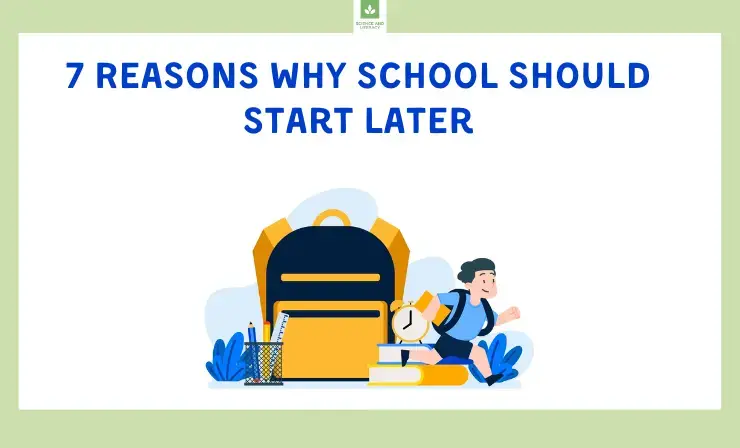
Reasons why School should Start Later in the Morning: – Better for students sleep and attendance – Don’t need to stay up as late to do homework because you can do it in the morning — Pisha 🍉 ⪩⚢⪨ Et Le Ena Piou (@mafuanenautism) September 30, 2022
On this page, you will discover:

7 Reasons Why School Should Start Later
1. improves academic performance.
Why It Is Important
2. Allows Teens to Get More Sleep
Adopting later school start times harmonizes with teenagers’ biological clocks, addressing the mismatch between early school schedules and adolescents’ sleep needs. The American Academy of Sleep Medicine’s recommendations highlight the importance of adequate sleep for teenagers, a demographic often burdened by early start times and societal pressures that encroach on their sleep duration. This shift not only ensures they meet the optimal sleep quota but also enhances their overall health and cognitive function.
3. Reduces Absenteeism
This not only benefits students’ academic performance and continuity of learning but also contributes to a more vibrant, participatory school environment. Improved health outcomes due to adequate sleep thus serve as a preventive measure against common ailments, ensuring that students remain present and engaged in their educational journey.
4. Lowers Risk of Depression and Mental Health Issues
The crucial relationship between sleep and mental health, particularly in adolescents, cannot be overstated. Addressing sleep deprivation through later school start times is a preventative measure that could significantly improve students’ mental health outcomes.
The interplay between sleep and mental health is critical, especially during the volatile adolescent years. Inadequate sleep has been consistently linked to increased risks of depression, anxiety, and other mental health issues. By shifting school start times later, students are afforded the opportunity to align their sleep schedules with their biological needs, significantly mitigating these risks.
5. Reduces Drowsy Driving in Teens
With the initiation of driving coinciding with the teenage years, the risk of drowsy driving becomes a pressing concern. Adjusting school start times to ensure teenagers get enough sleep could be a critical step in enhancing road safety and reducing accidents.
Teenage years coincide with the commencement of driving for many, introducing risks associated with drowsy driving. The CDC has identified sleep deprivation as a key factor in teen driving accidents. By enabling teens to align their sleep schedules with natural rhythms through later school start times, the incidence of drowsy driving can be significantly reduced.
This has the dual benefit of enhancing individual safety and contributing to broader public safety outcomes. Preventing accidents through such measures not only saves lives but also fosters a culture of responsible driving habits among young individuals.
Explore the findings of a new study on teen drivers and the risks of drowsy driving in this informative video recommended for viewing.
6. Helps Teens Feel Happier
By adopting later start times, schools can help rectify this misalignment, allowing students to adhere to a more natural sleep schedule. This adjustment can lead to improved mood, greater resilience, and a more positive outlook on life, which are crucial for healthy adolescent development and academic success.
Discover how a high school in Dedham, Massachusetts is combating student feelings of hopelessness with an innovative course on finding happiness through savoring experiences and fostering relationships in this inspiring video.
7. Reduced Stress
The stress induced by early mornings and lack of sleep can significantly affect students’ academic and social lives. By moving the start of the school day later, schools can alleviate a major source of daily stress, contributing to a healthier, more conducive learning environment.
By mitigating one of the many stressors in students’ lives, schools can create a more supportive and productive learning environment. The benefits of such a change extend beyond the individual, positively affecting the school culture and community at large.
The Potential Drawbacks of Starting School Later
1. scheduling sports and extracurriculars becomes more difficult.
One potential drawback of starting school later is the complication it introduces to scheduling sports and extracurricular activities. Many students are actively involved in after-school programs, including sports teams, clubs, and other organizations that play a significant role in their development. This presents a clear argument for why school should not start later, as it could lead to conflicts with extracurricular activities that depend on fixed schedules. This can result in logistical challenges for both students and program coordinators, potentially causing students to miss out on opportunities that contribute to their growth beyond academics.
In response to this challenge, schools and communities can adapt by rethinking and possibly reinventing the scheduling and structure of extracurricular activities. Flexibility in planning, such as holding some activities in the morning or making more efficient use of weekends, can ensure students continue to benefit from these programs. Moreover, a later start time might actually enhance student participation and performance in extracurriculars, as students would be better rested and more focused, potentially leading to a richer extracurricular experience.
2. Increases Childcare Costs and Logistical Challenges for Working Parents
The shift to later school start times can increase childcare costs and create logistical challenges for working parents. Parents may find themselves needing to arrange for additional morning care or adjust their work schedules to accommodate the change. This can add financial strain and complicate the balance between work and family life, creating stress and potentially impacting the overall well-being of families.
3. May Make After-School Jobs and Activities More Difficult
On the flip side, a later start time can lead to more alert and productive students, potentially making them more efficient in balancing work, activities, and school responsibilities. Schools and local businesses could collaborate to offer flexible working arrangements for students, recognizing the mutual benefits of supporting adolescent development while maintaining their contribution to the workforce and community engagement.
4. Reduces Time for Homework and Family Activities
A later dismissal time from school may compress the window available for homework, relaxation, and family time, essential components of a student’s well-being and academic success. This reduction in available time during the evening can increase stress and limit opportunities for meaningful family interaction and adequate academic preparation.
This challenge necessitates a more efficient approach to homework and after-school time management, potentially encouraging schools to reassess the volume and nature of homework assigned. With strategic planning and support, students can learn to manage their time effectively, ensuring they have sufficient opportunities for both academic responsibilities and family engagement. Additionally, the quality of family time can improve when students are less stressed and more rested, making the time spent together more meaningful.
The Impact of Delayed School Start Times in Seattle School District
The findings, published in Science Advances, revealed significant benefits stemming from the later start times. On average, students gained an additional 34 minutes of sleep per night, increasing their total nightly sleep from six hours and 50 minutes to seven hours and 24 minutes. This increase brought students closer to achieving the recommended sleep amount and marked a reversal in the century-long trend of gradual sleep loss among adolescents.
Despite the success observed in Seattle, such shifts in school start times remain relatively rare across the United States, where the typical start time still hovers around 8 a.m. However, the Seattle School District’s experience stands as a compelling testament to the benefits of later start times, supported by the American Academy of Pediatrics’ advocacy for this change as an effective countermeasure to the widespread issue of sleep deprivation among teenagers.
The Seattle School District’s initiative demonstrates a proactive approach to student health and education, providing valuable insights and evidence for other districts contemplating similar adjustments. By prioritizing the sleep needs of students, the district not only improved their academic and health outcomes but also set a precedent for the importance of aligning educational policies with scientific research on adolescent well-being.
Useful Resources
Final thoughts, leave a comment cancel reply.
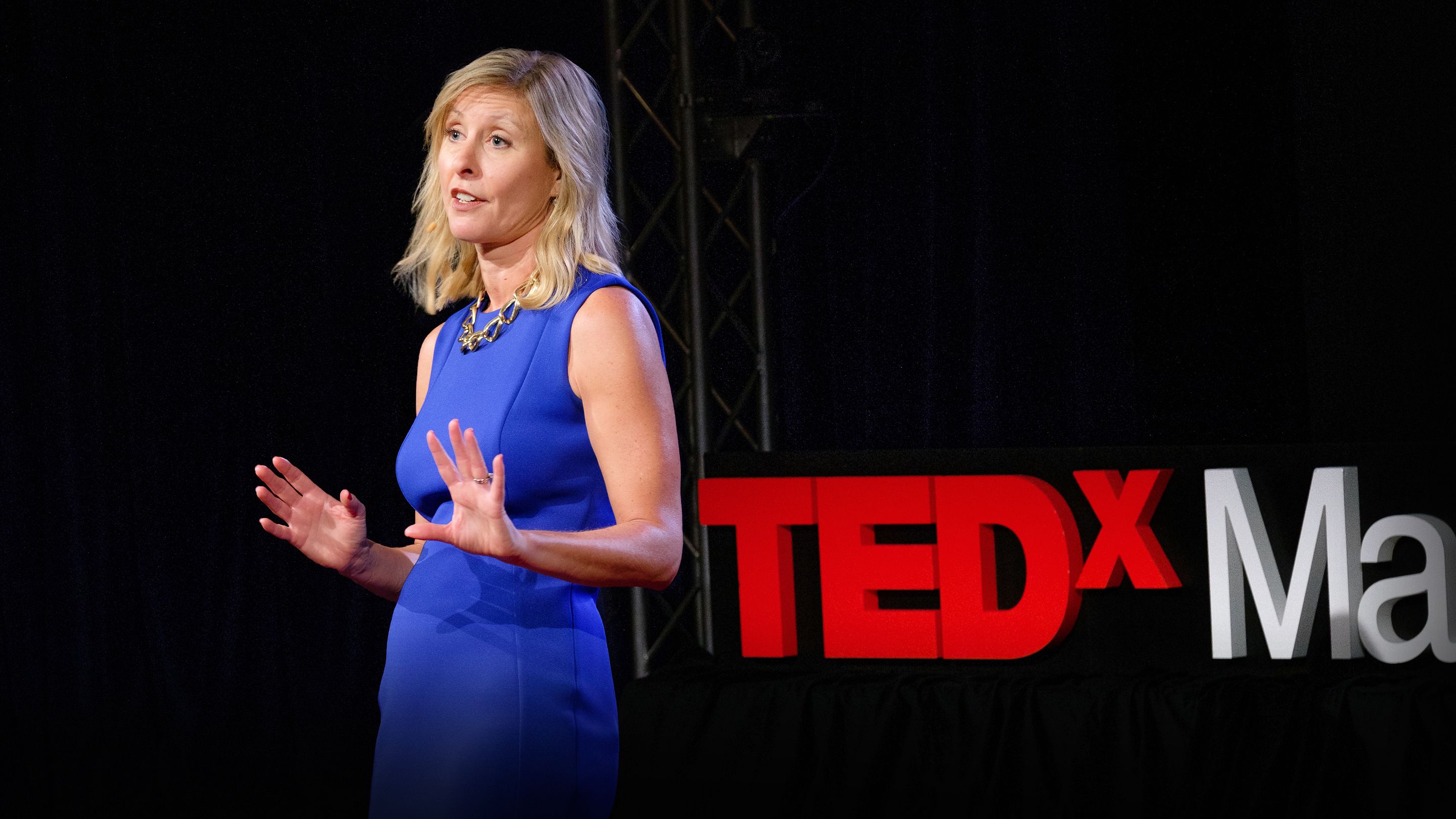
TED is supported by ads and partners 00:00
Why school should start later for teens
- social change
- personal growth

Later school times promote adolescent well-being
Moving high school start times can improve student performance and general quality of life
- Schools and Classrooms

Delaying start times
Though comprehensive national statistics on school start times are not available, it is common for American public high schools to begin their instructional day between 7–8 a.m. Research has shown that these early bell times are responsible for the discrepancy between how much sleep teens need and how much sleep they get. 9 When school systems have moved to later start times, they have found that their students get more sleep. 4,19 – 20 Numerous studies have been done with schools that have shifted to later start times; while individual differences in communities and research methodology have led to different outcomes, results are almost always positive. Benefits observed from later high school start times include: 4, 6,9 – 14, 16, 19 – 21
- Increased attendance rates
- Decrease in disciplinary action
- Decrease in student-involved car accidents
- Increase in student GPA
- Increase in state assessment scores
- Increase in college admissions test scores
- Increase in student attention
- Decrease in student sleeping during instruction
- Increase in quality of student-family interaction
These benefits are from studies of delayed start times in schools and districts across the country in Colorado, Connecticut, Kentucky, Minnesota, Missouri, Rhode Island, Virginia, & Wyoming. They have been done with schools in a broad range of developed environments–urban, suburban, and rural.
Sleeping in adolescence
The optimal amount of sleep for adolescents is approximately 9 ¼ hours nightly. 2 Surveys show that, while younger children generally get enough sleep, by early adolescence, most do not; this trend continues to worsen throughout the teenage years (See Figure 1 ). More than half of teens aged 15-17 sleep for 7 or fewer hours per school night.

Teens are notorious night owls – generally, they go to bed late in the evening and, when given the opportunity, wake up late in the morning. This tendency has biological and physiological roots. The sleep-wake cycle is governed by both the homeostatic drive for sleep (Process S) and the circadian rhythm (Process C). 5,8
- Process S builds during wakefulness and makes you feel tired. This process weakens during adolescence. 1,3
- Process C helps the body determine when the right time for sleep is. It naturally shifts later during adolescence. This is called Delayed Phase Preference. 18
Process S and Process C heavily influence mood and learning abilities. 17 While they are interconnected, fixing an issue with one does not mean that an issue with the other will be resolved. That is, simply going to bed earlier does not necessarily make someone less tired in the early morning hours. 9
Benefits of sleep
Scientists are still discovering new benefits of sleep. Research has suggested that sleep is vital to almost all areas of human functioning. Some benefits of sleep are listed below. 6,7,9,16,21
Sleep leads to increases in/benefits to:
- Memory & learning
- Emotional regulation
- Mental health & well-being
- Weight control/Body Mass Index (BMI)
Loss of sleep leads to decreases in/problems with:
- Information retention & cognition
- Student behavior and classroom conflict
- Attendance issues
- Mood regulation
Concerns about delayed start times have generally focused less on academic/social/cognitive outcomes and more on logistical complications. Some considerations include: 9
- Increased cost, congestion, & delays associated with having busses on the road later in the morning
- Inability of parents to rely on older children for afternoon childcare, as the lower schools would have effectively switched schedules with the upper schools.
- Scheduling conflicts for intervarsity/interscholastic events with neighboring jurisdictions that have earlier dismissal.
These issues are surmountable, and, with adequate planning, can be minimized or completely eliminated.
While implementation may be complex, particularly when a change would bring a school’s schedule out of sync with neighboring systems, delaying school start times so that adolescents begin their instructional day later provides numerous benefits to the students and their broader community alike.
1. Carskadon, M. A. (2011). Sleep in adolescents: The perfect storm. Pediatrics Clinics of North America, 58 , 637-647.
2. Carskadon, M. A. (2013). Optimal sleep habits in adolescents. In H. P. A. Van Dongen & G. A. Kerkhof (Eds.), Encyclopedia of Sleep, 190 , 86-87.
3. Carskadon, M. A., Acebo, C., & Jenni, O. G. (2004). Regulation of adolescent sleep: Implications for behavior. Annals of the New York Academy of Sciences, 1021 , 276-291.
4. Center for Applied Research and Educational Improvement. (1998). School start time study. Technical report: Vol. II. Analysis of student survey data.
5. Crowley, S. J., Acebo, C., & Carskadon, M. A. (2007). Sleep, circadian rhythms, and delayed phase in adolescence. Sleep Medicine, 8 , 602–612
6. Davison, C. M., Newton, L., Brown, R. S., Freeman, J., Ufholz, L. A., & Smith, J. D. (2012). Systematic Review Protocol: Later School Start Times for Supporting the Education, Health and Well-being of High School Students. The Campbell Collaboration .
7. El-Sheikh, M., Bagley, E. J., Keiley, M. K., & Erath, S. A. (2014). Growth in Body Mass Index From Childhood Into Adolescence: The Role of Sleep Duration and Quality. The Journal of Early Adolescence.
8. Hagenauer, M. H., Perryman, J. I., Lee, T. M., & Carskadon, M. A. (2009). Adolescent changes in the homeostatic and circadian regulation of sleep. Developmental Neuroscience, 31 , 276-284.
9. Kirby, M., Maggi, S., & D’Angiulli, A. (2011). School start times and the sleep-wake cycle of adolescents: A review and critical evaluation of available evidence. Educational Researcher. 40 (2), 56-61
10. National Sleep Foundation. (2005a). Changing school start times: Arlington, Virginia
11. National Sleep Foundation. (2005b). Changing school start times: Denver, Colorado
12. National Sleep Foundation. (2005c). Changing school start times: Fayette County, Kentucky
13. National Sleep Foundation. (2005d). Changing school start times: Jessamine County, Kentucky
14. National Sleep Foundation. (2005e). Changing school start times: Wilton, Connecticut
15. National Sleep Foundation. (2014). 2014 Sleep In America ® poll - Sleep in the modern family: Summary of findings.
16. Owens JA, Belon K, Moss P. (2010). Impact of delaying school start time on adolescent sleep, mood, and behavior. Archives of Pediatric & Adolescent Medicine, 164 (7), 608–14
17. Schmidt, C., Collette, F., Cajochen, C., & Peigneux, P. (2007). A time to think: Circadian rhythms in human cognition. Cognitive Neuropsychology, 24 , 755–789.
18. Tarokh, L., & Carskadon, M. A. (2009). Sleep in adolescents. In Squire, L.R. (Ed.). Encyclopedia of Neuroscience, 8 , Oxford Academic Press, 1015-1022
19. Vedaa, Ø., Saxvig, I. W., & Wilhelmsen-Langeland, A. (2012). School start time, sleepiness and functioning in Norwegian adolescents. Scandinavian Journal of Educational Research, 56 , 55-67
20. Wahlstrom, K. (2002). Changing times: Findings from the first longitudinal study of later high school start times. NASSP Bulletin, 86 (633) , 3–21.
21. Wahlstrom, K., Dretzke, B., Gordon, M., Peterson, K., Edwards, K., & Gdula, J. (2014). Examining the Impact of Later High School Start Times on the Health and Academic Performance of High School Students: A Multi-Site Study. Center for Applied Research and Educational Improvement.
Recommended Reading

You may also like
Subscriber Only Resources

Access this article and hundreds more like it with a subscription to Scope magazine.

Should School Start Later?
Experts say a later schedule could be good for your health.
- Purpose This debate has a clear purpose: to explore the question of whether school should start later.
- Structure The text is mostly informational. Points for and against pushing back school start times are woven throughout the article.
- Language Conventionality and Clarity Vocabulary: some challenging academic vocabulary (e.g., compelling, impede, invest) Conventionality: The language is mostly conventional.
- Anchor Standards R.1, R.2, R.6, R.8, W.1, W.4, W.5, W.7, SL.1, L.4, L.6
- Grade 6 RI.6.1, RI.6.2, RI.6.6, RI.6.8, W.6.1, W.6.4, W.6.5, SL.6.1, L.6.4, L.6.6
- Grade 7 RI.7.1, RI.7.2, RI.7.4, W.7.2, W,7.4, W.7.5, SL.7.1, SL.7.2, L.7.4, L.7.6
- Grade 8 RI.8.1, RI.8.2, RI.8.6, RI.8.8, W.8.1, W.8.4, W.8.5, SL.8.1, L.8.4, L.8.6
- 1a, 1c, 1d, 2a, 2b, 3a, 4a, 5a, 5b, 5d, 5e, 5f, 5g, 5h, 5i, 6a, 6b, 6c, 6d, 6e, 6f, 6g, 6h, 6i, 6j, 8d, 8e, 8f, 9a, 9b, 9c, 9d, 9e, 9f, 9g, 10a, 10b, 10c, 10d, 10e, 11c, 11d, 12d, 12f, 12g, 12h, 12i, 12j
- Lesson Plan
Presentation View
Want to hear this story read aloud? Click here!
Your phone shrieks. Confused and groggy, you open your eyes. Surely it isn’t time to get up already? You tap snooze and sink back into dreamland—until your dad knocks on the door.
“Wake up!” he calls. “The bus will be here in 10 minutes!”
You groan. Five more minutes. Please, please, pleeaasseeeee!
If this sounds familiar, you aren’t alone. Before the pandemic, nearly 70 percent of teens weren’t getting enough sleep.*
Last year, things were different. Many teens were able to sleep in because remote classes started later, didn’t require a commute, or gave students flexibility in their schedules. But now that in-person school has resumed, teens across America are once again battling their alarms, and a debate has reignited: Should school start later?
The Science of Sleep
In the U.S., the average start time for middle and high schools is a few minutes after 8 a.m. It hasn’t always been this way, though. A century ago, most schools started around 9 a.m. Then in the 1970s, districts began shifting to earlier schedules for teens, with elementary age kids starting later. This saved districts money because it reduced the number of buses needed: When start times are staggered, the same buses can make multiple trips; otherwise, you need enough buses to transport all elementary, middle, and high school students at once.
Today, we know much more about teens and the science of sleep. Scientists now understand that adolescents experience something called “phase delay.” Here’s how it works: At night, our bodies release a hormone called melatonin that makes us sleepy. Around middle school, this melatonin release gets pushed back by one to two hours. As a result, many teens have a hard time falling asleep before 11 p.m. If you have to be at school by 8 a.m., it can be tough—if not impossible—to get the 8 to 10 hours of sleep you need to be healthy.
And that’s a problem.
“If teens aren’t getting enough sleep, it’s going to impact every aspect of their life,” says Dr. Lisa Meltzer, a sleep psychologist.
Indeed, being exhausted can make you cranky and sad. It can make it harder to concentrate, sit still, and learn. And it can weaken your immune system and impede your ability to make good decisions.
Given how critical sleep is to your well-being, it’s no surprise many experts recommend that middle and high schools start no earlier than 8:30 a.m.**
Benefits and Drawbacks
In 2017, Cherry Creek school district in Colorado pushed back start times for its middle and high schools. Since then, students have said they are less sleepy during the school day and participate more in first period. Meltzer, who led a study of Cherry Creek students, found that kids were sleeping more—and they stopped falling asleep doing their homework.
Over the past few years, hundreds of other schools have also experimented with later start times. The results have been promising, with students feeling more alert and fewer incidents of tardiness.
If later start times are good for teens, why doesn’t everyone make the switch? Unfortunately, it’s not so simple. For one thing, starting later means ending later, which leaves less time for after-school activities like sports, dance, and music. For outdoor activities, this is especially problematic during the winter, when daylight hours are limited.
Later dismissal times could also cut into after-school jobs and create scheduling conflicts for families. In Cherry Creek, some families say they have less time in the evening for homework and dinner.
Transportation is another obstacle. Later start times could require some districts to invest in additional buses and drivers, which can be costly. And many parents might not be able to drive their kids to school before work.
Of course, early start times aren’t the only reason that teens are exhausted. Many things can get in the way of a good night’s sleep, such as caffeine, stress, overscheduling, and too much screen time.
Still, the benefits of a later start time are compelling. So what do you think? Should more schools start later?
*Centers for Disease Control and Prevention
**Recommended by the American Academy of Sleep Medicine, American Academy of Pediatrics, American Medical Association, and Centers for Disease Control and Prevention
Writing Task
Should school start later?
Go back to the article and find arguments that support each side of this debate. Write the information you find on a piece of paper. You can use this information in an argument essay on this topic.
This article was originally published in the October 2022 issue .
Close Reading, Critical Thinking, Skill Building
1. preparing to read.
- Give students a minute or so to preview the text features—the headline, illustrations or photos, any charts or graphs, etc. Ask them what they think the article is going to be about.
- Project the list of Vocabulary Definitions (available in your Resources tab) for students to refer to as they read. The reinforcement activity may be completed after reading or assigned as homework.
2. READING AND TEXT MARKING
- Read both texts as a class.
- Ask: “No matter what you personally think about this issue, which author do you think makes the better argument?” Take a poll and tally the results on the board.
- Project the first text. Complete the Scavenger Hunt, modeling text marking on your whiteboard while students mark their magazines. Or, distribute the Scavenger Hunt activity (available in your Resources tab).
3. DISCUSSION
Discuss the following as a class.
- What do the authors agree about? What do they disagree about?
- Which images support each author’s argument? How?
- What is each author’s tone? Explain your answer.
- Divide students into groups according to which author they believe makes the stronger argument. Have the groups stand on opposite sides of the room. Students can then debate: One student offers a reason (support) for his or her opinion; a student from the other group responds. Students should quietly walk to the other side of the room if at any point during the debate they change their minds; be sure to ask any student who does this why he or she did so.
- At the end of the debate, compare the number of students who support each author with the number who supported each author before the debate.
Start high school later for better academic outcomes
Subscribe to the center for economic security and opportunity newsletter, david figlio david figlio dean - the school of education and social policy at northwestern university.
May 25, 2017
- 12 min read
Many proposals for improving student performance involve very costly interventions. And while quite a few of these costly interventions surely pass benefit-cost tests, they can be extremely challenging, politically or financially, to implement.
One possible source of “low-hanging fruit” involves changing the ways in which schools are organized. As one example, in a very useful recent policy proposal, Jacob and Rockoff propose three low-cost ways to organize schools to maximize student performance: combining elementary and middle schools into single buildings; optimizing teacher assignment policies; and starting school later in the day for middle and high school students. 1 Of Jacob and Rockoff’s proposals, this third idea seems particularly actionable: New buildings need not be built or retrofitted, and the nature of teachers’ jobs would not appreciably change. School districts that start elementary schools later and high schools earlier could potentially swap these schedules without major transportation disruptions. This would permit adolescents to sleep later and therefore arrive at school more ready to learn.
Why start school later for adolescents? The answer rests in our biology. Circadian rhythms influence our sleep patterns, and the degree of light on the outside of our eyelids affects our melatonin secretion and feelings of alertness or fatigue. 2 As children enter puberty, their nocturnal melatonin production shifts several hours later than what occurred when they were younger—or when they become adults. 3 As a consequence, the American Academy of Pediatrics suggests that adolescents sleep until at least 8:00 am. 4 But thanks to a wide range of factors, half of all U.S. high schools start by that time. 5 Given this discordance between natural sleep rhythms and school start times for adolescents, it’s no surprise that students lose as much as two hours of sleep per night when they start school in the fall relative to the summer. 6
It’s difficult to know exactly how this disconnect between teenagers’ optimal sleep times and school schedules affects their classroom performance because school districts that start high schools later might be better-resourced or otherwise support students better than do those that start high schools earlier in the day. One innovative study looks at U.S. Air Force Academy freshmen cadets who were randomly assigned to earlier or later start times (thanks to having a class in the first period or not) and shows that having a first period class substantially reduces achievement—both for the first period class and for the rest of the day. 7 And there exists some case study evidence from Wake County, NC, which changed middle school busing schedules, suggesting that later start times for adolescents improves test scores. 8 Other case study evidence from Minneapolis, which shifted start times later by an hour and a half, is more mixed, with increased teacher-assigned grades and other aspects of student well-being but no improvements in ACT scores. 9
A major just-published study by Heissel and Norris 10 provides the first evidence using large-scale population-level data on this topic. 11 One way in which this paper represents a large step forward is that it is the first study, to my knowledge, to investigate this question using data from more than one institution or one school district—thereby substantially enhancing external validity. This new paper also has strong internal validity as well: The authors focus their attention on the relationship between sunlight and sleep, and take advantage of the fact that the state of Florida, where they conduct their research, is divided into two time zones. The sun comes up an hour later, on the clock, in the Eastern Time Zone than a few miles west in the Central Time Zone, but schools only partially account for this difference when setting their start times, so, on average, students in the Central Time Zone in Florida have more than half an hour more sunlight before school starts than do their counterparts in the Eastern Time Zone, and some have an hour or more additional sunlight, depending on when school starts.
One might be concerned that people living in different parts of Florida are somehow different in other ways as well, and Heissel and Norris are able to deal with this concern by concentrating on students who moved between time zones , while remaining in the northern part of Florida (typically called the Panhandle). Some students moved between the Eastern Time Zone and the Central Time Zone, thereby gaining extra sunlight in the morning before school, while others moved from the Central Time Zone to the Eastern Time Zone, thereby losing some sunlight before school starts. Their strategy, therefore, is to compare the same students’ test performance before versus after their cross-time zone moves. The authors found that people making these eastward and westward moves in the Florida Panhandle were similar across a large range of characteristics, and tended to follow similar over-time test score trends prior to their moves.
What happens when children get an extra hour of sunlight before starting school? (The authors estimate the effect of each additional minute of pre-school sunlight, and I’m presenting the effects of a 60 minute difference for ease of explication.) If they are young, math scores are barely affected—the estimated score improvement is just one percent of a standard deviation—but reading scores increase by six percent of a standard deviation. But once they reach puberty (approximately at age 11 for girls and age 13 for boys) math scores improve by eight percent of a standard deviation and reading score improvements remain at six percent of a standard deviation. The increased amounts of sunlight prior to school start only modestly reduces absence rates—and more for young children than for teenagers—indicating that these improved student outcomes are probably due to increased alertness, rather than to more time in school.
The post-adolescent math performance bumps associated with more daylight prior to school are about the same for boys and girls alike. They are present for both white and non-white students (with slightly higher estimated effects for non-white students). They are present for both relatively affluent and relatively disadvantaged students (with somewhat higher estimated effects for students not eligible for free or reduced-price lunches). In sum, it appears that more daylight before school starts helps a wide range of adolescents better learn math. Moreover, the authors show that the benefits occur immediately and persist for years.
Do these results reflect the cumulative effect of more sunlight over the course of the entire school year, or do they just reflect alertness on the day of the exam? The answer to this question has important implications for whether it makes sense to shift the school day back in general for adolescents, or whether this is really just a test-day phenomenon. To address this question, Heissel and Norris take advantage of the fact that Florida changed the timing of its high-stakes testing from year to year and the dates of the start of daylight savings time changed from year to year. As a consequence, in some years the high-stakes testing took place just before the start of daylight savings time, when pre-school daylight was highest; in other years, the high-stakes testing took place just after the start of daylight savings time, when pre-school daylight was nearly an hour less; and in still other years, the high-stakes testing took place a month after the start of daylight savings time, when pre-school daylight was somewhere in the middle.
When the authors make this comparison, they find that the amount of sunlight on the day of the test can explain a portion of the reading results—recall that they find that more sunlight in general helps pre-pubescent and adolescent children approximately equally in reading as well—but it doesn’t explain much of the math results. Most of the boost in adolescent test performance that we observe when students have more daylight in the morning is due not to the amount of daylight before school on days when children take tests, but rather to the amount of daylight before school experienced across the school year. Daylight before school apparently boosts cumulative learning for adolescents—and not just test-day alertness.
What do these findings imply for optimal school schedules—at least, from the point of view of maximizing student math and reading achievement? Heissel and Norris carried out a thought exercise in which, for every Florida panhandle school district, they assigned the school district’s earliest start times to elementary students, the middle start times to middle school students, and the latest start times to high school students. This calculation would move elementary school start times 22 minutes earlier, middle school start times 13 minutes earlier, and high school start times 44 minutes later, on average.
Heissel and Norris estimate that making these scheduling switches would raise average math performance by six percent of a standard deviation and average reading performance by four percent of a standard deviation. While not earth-shattering performance changes, they are extremely impressive for a policy change that would cost school districts little to implement – and are approximately one-fourth the difference between an excellent-performing school and an average-performing school. (Recall, also, that most parts of the United States have less daylight between September and March than Florida does!)
There are, of course, potential costs associated with this type of schedule change. Parents might be more comfortable with high schoolers traveling to school in the dark than they are with elementary school-aged children doing the same. Starting elementary school relatively early could have implications for parents’ after-school child care arrangements as well. High schoolers have more after-school activities, sports, and the like, and later school start times might put the squeeze on these types of activities. For instance, later school start times might mean that more students participating in after-school activities will arrive home after dark, which might also cause concern. And given a school start time, at least one study shows that students learn more in the morning than they do in the afternoon 12 (though a later start time can put adolescents in a better position to learn).
Nevertheless, there are few “quick wins” in education when it comes to boosting learning at a very low cost, and paying attention to—and scheduling school start times in line with—human biology seems to be one of them.
The author did not receive financial support from any firm or person with a financial or political interest in this article. He is currently not an officer, director, or board member of any organization with an interest in this article.
- Brian Jacob and Jonah Rockoff, “ Organizing Schools to Improve Student Achievement: Start Times, Grade Configurations, and Teacher Assignments ,” Hamilton Project Discussion Paper 2011-08, September 2011.
- See, e.g., Josephine Arendt, “ Melatonin, Circadian Rhythms, and Sleep ,” New England Journal of Medicine , 2000.
- See, e.g., Mary Carskadon, Christine Acebo, and Oskar Jenni, “ Regulation of Adolescent Sleep: Implications for Behavior ,” Annals of the New York Academy of Science , 2004.
- American Academy of Pediatrics, Adolescent Sleep Working Group and Committee on Adolescence, “ School Start Times for Adolescents ,” Pediatrics , 2014.
- National Center for Education Statistics, “ Average Start Time for Public High Schools and Percentage Distribution of Start Times in Public High Schools, by Selected School Characteristics ,” 2012.
- Martha Hansen, Imke Janssen, Adam Schiff, Phyllis Zee, and Margarita Dubocovich, “ The Impact of School Daily Schedule on Adolescent Sleep ,” Pediatrics , 2005.
- Scott Carrell, Teny Maghakian, and James West, “ A’s from Zzzz’s? The Causal Effect of School Start Time on the Academic Achievement of Adolescents ,” American Economic Journal: Economic Policy , 2011.
- Finley Edwards, “ Early to Rise? The Effect of Daily Start Times on Academic Performance ,” Economics of Education Review , 2012.
- For instance, Peter Hinrichs, “ When the Bell Tolls: The Effects of School Starting Times on Academic Achievement ,” Education Finance and Policy, 2011, found no benefits in terms of ACT scores. Kyla Wahlstrom, “ Changing Times: Findings from the First Longitudinal Study of Later High School Start Times ,” NASSP Bulletin, 2002, found improvements in other student outcomes.
- Jennifer Heissel and Samuel Norris, “ Rise and Shine: The Effect of School Start Times on Academic Performance from Childhood through Puberty ,” Journal of Human Resources , published online before print, April 19, 2017.
- In the interest of full disclosure, I was Heissel’s Ph.D. dissertation adviser and I am also editor-in-chief of the Journal of Human Resources, where this paper was published. However, the paper was handled from start to finish by a different Coeditor, and I had no influence over the publication process.
- Nolan Pope, “ How the Time of Day Affects Productivity: Evidence from School Schedules ,” Review of Economics and Statistics , 2016.
Economic Studies
Center for Economic Security and Opportunity
Douglas N. Harris
June 6, 2024
Emily Markovich Morris, Laura Nóra, Richaa Hoysala, Max Lieblich, Sophie Partington, Rebecca Winthrop
May 31, 2024
Jennifer B. Ayscue, Kfir Mordechay, David Mickey-Pabello
March 26, 2024
It’s a wonderful world — and universe — out there.
Come explore with us!
Science News Explores
Let’s learn about why schools should start later.
Most U.S. high schools start before 8:30 a.m. — too early, according to experts
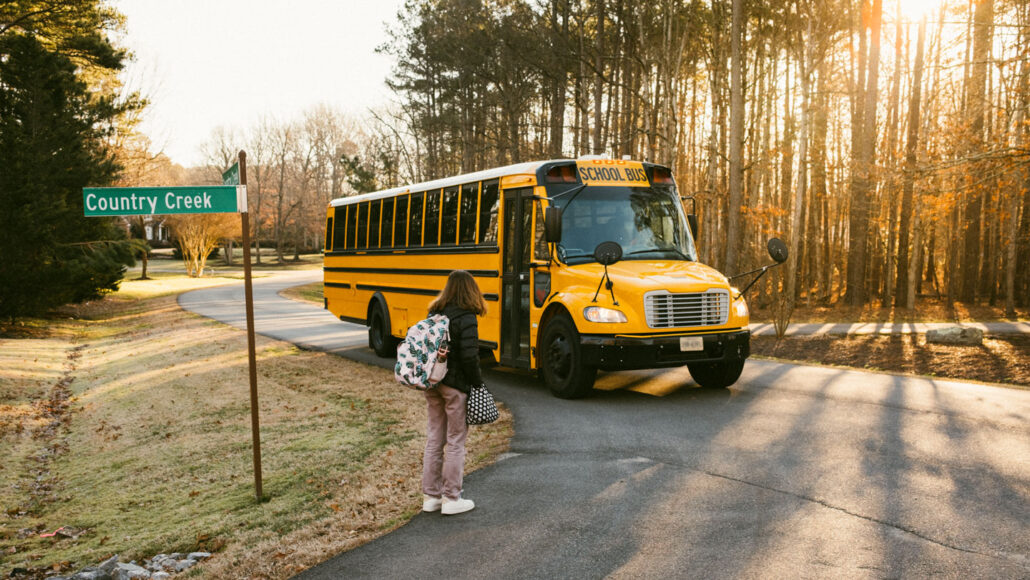
When school times start later, teens tend to feel better and do better in school.
ferrantraite/E+/Getty Images
Share this:
- Google Classroom
By Maria Temming
January 17, 2023 at 6:30 am
One of the hardest things about going back to school after a break is waking up for it. And unfortunately, many schools start too early, according to scientific experts.
The American Academy of Pediatrics says that middle and high schools shouldn’t start before 8:30 a.m. That’s because as people go through puberty, their internal clocks naturally shift . It becomes hard for them to nod off before 11:00 p.m. But teens still need an average of nine hours of sleep per night. So, when they have to get up before the sun peeks over the horizon, they miss out on crucial shut-eye.
Dozing in class is only the most visible of problems cause by this lack of sleep. That sleep now lost to early alarm clocks is vital for helping the body grow and heal from illness or injuries. The brain also loses out on time to process memories. Sleepy teens are more likely to feel anxious or depressed, as well as use drugs or alcohol. And sleeping in on weekends is no replacement for lost zzz’s during the week. Binge-sleeping poses its own health risks .
Some schools have shifted their start times to later in the morning. Researchers are now tracking the impacts. It seems that teens who start school later do get more sleep. They’re more likely to get to class on time and stay awake during the day. They even seem to do better in school .
Educators and Parents, Sign Up for The Cheat Sheet
Weekly updates to help you use Science News Explores in the learning environment
Thank you for signing up!
There was a problem signing you up.
Want to know more? We’ve got some stories to get you started:
Starting schools later leads to less tardiness, fewer ‘zombies’ With extra sleep, teens are less likely to oversleep or feel tired every day, data show. (10/5/2021) Readability: 6.9
Later school starts linked to better teen grades Low-income students also may find it easier to get to school with later start times. (2/5/2019) Readability: 6.7
Survey finds U.S. schools start ‘too early ’ Majority of U.S. public middle and high schools start before 8:30 a.m. (9/10/2015) Readability: 6.0
Explore more
Scientists Say: Circadian
Scientists Say: Melatonin
Explainer: The teenage body clock
Let’s learn about sleep
The steady creep of less sleep
Study links weight to when the school bell rings
Early school starts can turn teens into ‘zombies’
Surprise! Exam scores benefit from months of regular sleep
You may not be able to control when your school starts. But you can try to get the most shuteye — and the most out of it — possible. Find out how healthy your sleep schedule is by keeping a sleep diary . Track when you wake up and go to bed, as well as daytime activities that can affect sleep — such as exercise, drinking caffeine and napping. This can help you find out whether any part of your daily routine might be making it harder to get enough sleep. Plus, check out these tips for improving your “sleep hygiene.”
More Stories from Science News Explores on Science & Society

Does AI steal art or help create it? It depends on who you ask

AI image generators tend to exaggerate stereotypes

Common high-school textbooks promote unscientific views on gender

This computer scientist is making virtual reality safer

Scientists Say: Correlation and Causation

Artificial intelligence is making it hard to tell truth from fiction

Earthquake sensor: Taylor Swift fans ‘Shake It Off’

Cake-cutting math offers lessons that go far beyond dessert plates
Why Should School Start Later?
| 4 | |
| 941 | |
| , , , |

Table of Contents
Teens reverie sleep each day. This need does not imply laziness on their part or lack of ambition thereof. Instead, sleep cycles change as children grow into adolescence. In adolescence, teens stay up until late and only get up late. It happens because their bodies release a hormone called melatonin which regulates their sleep. Consequently, the melatonin-induced rest keeps teens asleep until 8 a.m. making it appropriate to go to school later. Schools starting later help improve physiological and psychological well-being and help improve learners’ educational performance.

Physiological and Physical Well-Being
Arguably, the most crucial reason schools should start later is adolescent physiology. Adolescents are still growing and developing, and their body clocks are still changing. Studies have shown that, due to these changes, adolescents tend to go to bed later and wake up later than adults, leading to a lack of sleep (Crowley et at., 2018). This lack of sleep can negatively affect adolescents’ physical and mental health, such as fatigue, irritability, and poor concentration. Starting school later would allow adolescents to get the amount of sleep they need. A study by the Centers for Disease Control and Prevention (CDC) found that when schools started later, adolescents got an extra 42 minutes of sleep per night compared to when schools began earlier. This extra sleep can help to improve their physical and mental health and can help to improve their performance in school.
The teenage years are a time of rapid physical and psychological growth and development. As adolescents try to figure out who they are and where they fit in, they often feel overwhelmed by the pressures of school, their peers, and society. As a result, adolescents are more prone to stress and anxiety than adults. One way to help reduce this stress is to start school later in the morning. By giving adolescents more time to rest and relax before facing the pressures of school, they can better manage their stress levels (Freeman et at., 2020). Studies have shown that adolescents report feeling less stressed, more rested, and more alert when school starts later in the morning. These findings suggest that starting school later in the morning can reduce stress and improve psychological functioning in adolescents. In addition to reducing stress, starting school later can also help to enhance adolescents’ self-esteem.

Adolescents often struggle with insecurity and self-doubt as they try to fit in with their peers and find their place in the world (Freeman et al., 2020). As a result, they often compare themselves to their peers, leading to feelings of inadequacy and low self-esteem. Starting school later can reduce this pressure by giving adolescents more time to rest and relax. This habit can help adolescents to accept themselves for who they are and be more confident in their abilities. Evidence from studies has shown that when school starts later in the morning, adolescents report feeling more positive about themselves, including handling more confident, less anxious, and less stressed (Patrick et al., 2020). Starting school later can also help adolescents better manage their emotions. Adolescents often struggle with regulating their emotions and can become easily overwhelmed by their feelings. These emotional states can lead to irritability, impulsivity, and aggression. However, starting school later in the morning can help reduce these feelings, giving adolescents more time to rest and relax before facing the pressures of school. Evidence from studies has shown that when school starts later, adolescents report feeling less irritable, more alert, and more capable of managing their emotions.
Educational Reasons
The most apparent educational benefit of starting school later is that it gives students more time to sleep. Sleep is an essential part of a healthy lifestyle and is vital for students’ physical and mental health. A later start can give students more time to get the sleep they need to be well-rested and alert during the school day. Studies have shown that students who get adequate sleep are more likely to perform academically, attend better, and be more motivated in school (Sweller et al., 2019). In addition to the potential health benefits of getting more sleep, starting school later can also provide more time for learning and development. With more time in the morning, adolescents can participate in activities such as studying, reading, or reviewing material they learned the previous day. This action can help improve their understanding of the material and help them retain the information longer.

A later start time can also provide more time for extracurricular activities and sports. These activities can help improve adolescents’ physical health and provide them with opportunities for social interaction and emotional development (Freeman et al., 2020). Providing adolescents more time for these activities can help improve their overall well-being. Furthermore, starting school later can help to reduce the stress that students often experience. With a later start time, students can spend more time on activities they enjoy and less worrying about getting up for school in the morning. This will help reduce stress levels and allows students to focus more on their education.
In conclusion, there are many advantages to having school start later. School starting later would give students more time to get adequate sleep, which helps with their mental and physical health. Furthermore, students would be more alert and have better focus during their classes, allowing them to absorb more information and make better grades. Later starting times also give students more time to spend on extracurricular activities and less time worrying about homework and exams. Finally, starting school later would reduce students’ stress and help create a more positive school environment. In addition, starting school later would benefit both students and teachers, an idea that school administrators should seriously consider.

- Crowley, S. J., Wolfson, A. R., Tarokh, L., & Carskadon, M. A. (2018). An update on adolescent sleep: New evidence informing the perfect storm model. Journal of Adolescence, 67 , 55-65.
- Freeman, S., Marston, H. R., Olynick, J., Musselwhite, C., Kulczycki, C., Genoe, R., & Xiong, B. (2020). Intergenerational effects on the impacts of technology use in later life: Insights from an international, multi-site study. International Journal of Environmental Research and Public Health, 17 (16), 5711.
- Patrick, S. W., Henkhaus, L. E., Zickafoose, J. S., Lovell, K., Halvorson, A., Loch, S., … & Davis, M. M. (2020). The well-being of parents and children during the COVID-19 pandemic: A national survey. Pediatrics , 146 (4).
- Sweller, J., van Merriënboer, J. J., & Paas, F. (2019). Cognitive architecture and instructional design: 20 years later. Educational Psychology Review, 31 (2), 261-292.
- Academic Success
- Child Observation
- Early Childhood Education
- High School
- Homeschooling
- Is College Worth It
- School Uniforms
- School Violence

Why both teens and teachers could benefit from later school start times
Lecturer in Science Education, Sussex School of Education and Social Work, University of Sussex
Disclosure statement
James Williams does not work for, consult, own shares in or receive funding from any company or organisation that would benefit from this article, and has disclosed no relevant affiliations beyond their academic appointment.
University of Sussex provides funding as a member of The Conversation UK.
View all partners

A typical school day in the UK starts around 8.30am. This is often even earlier elsewhere in the world, with students sitting down to their first lesson at 7.30am in the US.
But these early start times can play havoc with teenager’s natural sleeping patterns – with research showing that waking a teenager at seven in the morning for school is similar to waking an adult at four in the morning . And while many adults wouldn’t relish such an early alarm call every working day, it’s a “non-negotiable” expectation for teenagers.
The average teenager ideally needs eight to nine hours’ sleep each night, but in reality a lot of teenagers struggle to get this much – which can then impact their performance in the classroom.
A lot of the problems arise because our sleep patterns are not fixed, and they change as we grow . For teenagers, melatonin – the sleep hormone – doesn’t start being produced until 11pm. This is why teens don’t start feeling sleepy until late at night, and why simply telling a teenager to go to bed earlier doesn’t work.
This has led to calls for later school start times for teenagers to align more closely with their bodies’ biology.
What the research shows
A major study published in 2014 examined the impact of later start times on 9,000 US teenagers. Researchers found that:
Grades earned in core subject areas of math, English, science and social studies, plus performance on state and national achievement tests, attendance rates and reduced tardiness show significantly positive improvement with the later start times.
They also found that with less sleep than recommended, the students reported that they had:
Significantly higher depression symptoms, greater use of caffeine, and are at greater risk of making poor choices for substance use.
In the US – where teenagers can legally drive from the age of 16 – the research also found later start times led to a decrease in car accidents involving teenage drivers.
Why teenagers sleep differently
To understand why a later school start time can make such a difference to teenagers’ lives, we need to take a look at the biology that governs their sleep wake cycle.
We all have a sort of hardwired “clock” in the brain – this is often referred to as our body clock. This “clock” controls the production of the hormone melatonin, and in turn, melatonin controls sleep. Melatonin is naturally produced in the brain and starts the process of sleepiness by telling your body that it’s time for bed.
Once asleep, we normally go through five sleep stages a night. And one of the stages – the REM (Rapid Eye Movement) stage – varies significantly with age.

REM sleep is linked to learning, and it’s during REM sleep that we dream. It is characterised by quick, random movements of the eyes and paralysis of the muscles. REM sleep normally makes up around 20-25% of an adult human’s total time spent asleep – or 90 to 120 minutes. We get to REM sleep about 70 to 90 minutes after falling asleep. And if we don’t achieve REM sleep, we wake up feeling tired.
Studies have also shown that lack of REM sleep can impact our ability to learn . And this is what happens to teenagers who do not get their full allocation of sleep. They fail to get to REM sleep and then wake up feeling tired, which can then impact their ability in the classroom that day.
The benefits for late starters
So a later school start time could help to solve this problem, by ensuring teenagers get their eight plus hours of sleep and react properly to their body’s natural rhythms.
The American Academy of Pediatrics , said in a policy statement in 2014 that:
Delaying school start times is an effective countermeasure to chronic sleep loss and has a wide range of potential benefits to students with regard to physical and mental health, safety, and academic achievement.
I believe we should also look again at the timing of the whole school day and see if we can make it better for everyone. Because in my experience, there has been a general shift over the past 25 years to shorten the school day.
This is not at the cost of teaching time (which has remained constant) but at the cost of natural breaks, which has led to reduced lunch times and lesson breaks.

This is mainly because it makes the management of children easier. Supervising hundreds of children “playing” requires effective staffing. And there is always the fear that behaviour deteriorates during breaks. So the theory goes that having them in class and strictly supervised must be better.
But this means that students barely have enough time to absorb what they were doing in maths before suddenly they are thrust into ancient history. And teaching staff also transition from one class to another, with hardly a rest or time to refocus.
Clearly rethinking the school day could benefit everyone involved. Yes, there may be challenges in terms of parental work patterns, transport to school or changing childcare arrangements, but it could also lead to better achievement in teenagers and less of a struggle for parents in the mornings. For teachers, it could also mean a less stressful day all around – and what could be better than that?
- School start times
- Teens and sleep

Head of School, School of Arts & Social Sciences, Monash University Malaysia

Chief Operating Officer (COO)

Clinical Teaching Fellow

Data Manager

Director, Social Policy
- Share full article
Advertisement
Supported by
student opinion
Should Your School Day Start Later?
If it did, would students get more sleep? Or would they just stay up later?

By Shannon Doyne
Find all our Student Opinion questions here.
Do you get enough sleep during the school year? If not, what keeps you from being well rested?
Do you wish your school day started later? In your opinion, what would be the advantages and drawbacks of a later start time?
In “ California Tells Schools to Start Later, Giving Teenagers More Sleep, ” Christine Hauser and Isabella Kwai write about a new California law that pushes back start times at most public middle and high schools. The law cites research that says attendance and performance will improve if teenagers get more sleep. The article states:
The passage of the law followed years of mounting calls for later school start times from sleep experts who said such a move would optimize learning, reduce tardiness and contribute to overall well-being. The law encourages districts to publish research on their websites about the impact of sleep deprivation on adolescents. A frequently cited policy statement from the American Academy of Pediatrics, made in 2014, called insufficient sleep for adolescents a “public health issue” and recommended that most schools start no earlier than 8:30 a.m. The American Academy of Sleep Medicine agreed. In one 2006 poll from the National Sleep Foundation, 45 percent of adolescents in the United States said they slept for an insufficient length of time on school nights, and 19 percent of students said they fell asleep in school at least once a week. Another study, published in 2017 by the University of Minnesota, which surveyed 9,000 students across five school districts with varying start times, found that those who started school later slept more. Students who had more sleep reported better mental health outcomes and less use of substances like alcohol and cigarettes. Students who slept more also had improved attendance and enrollment rates, and they were less likely to drive while drowsy. About 90 percent of high schools and 80 percent of middle schools in the nation start before 8:30 a.m., the Centers for Disease Control and Prevention said in 2014.
Students, read the entire article, then tell us:
Do you feel like you get enough sleep?
What would be your ideal time to start the school day? What about to end the school day? Why?
How would changing your school’s start and end times affect activities like sports, clubs and part-time jobs?
Anthony J. Portantino, a Democratic state senator who wrote the bill, calls later start times for schools a “magic bullet” when it comes to education. What are your thoughts on this? Can later start times really improve things like test scores, attendance and graduation rates? Explain.
Students 13 and older are invited to comment. All comments are moderated by the Learning Network staff, but please keep in mind that once your comment is accepted, it will be made public.
Essay Service Examples Education Starting School Later
Why Should School Start Later Essay
- Proper editing and formatting
- Free revision, title page, and bibliography
- Flexible prices and money-back guarantee

Our writers will provide you with an essay sample written from scratch: any topic, any deadline, any instructions.
Cite this paper
Related essay topics.
Get your paper done in as fast as 3 hours, 24/7.
Related articles
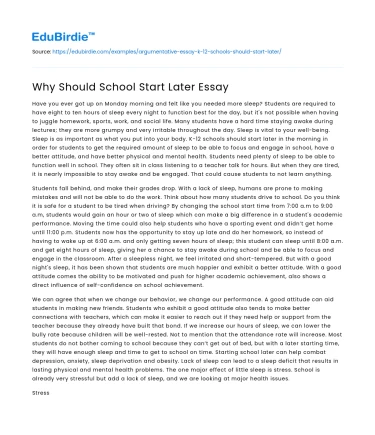
Most popular essays
- Sleep Deprivation
- Starting School Later
Whether you are a parent of a teenager, or are a teen yourself you have most likely struggled with...
On average, schools in Canada start at 8:30 a.m. but some schools in our region such as Silver...
During school hours, everyone usually lazily gets to class, and sometimes, if they’re late when...
The California Legislative Information alleges that the new California Senate Bill No. 328,...
- High School
Not many people can honestly say that they are one hundred percent a ‘morning person’, and for...
On average teenagers are missing out on 10 hours of sleep per week due to having to start school...
Across the United States, 93% of high schools start at or before 8:30 a.m. Of these, there are...
How much money you would pay to save the life of a loved one? How much to save the life of a...
We are Group 1 and we believe that the school day should not start later than 7:30 a.m because of...
Join our 150k of happy users
- Get original paper written according to your instructions
- Save time for what matters most
Fair Use Policy
EduBirdie considers academic integrity to be the essential part of the learning process and does not support any violation of the academic standards. Should you have any questions regarding our Fair Use Policy or become aware of any violations, please do not hesitate to contact us via [email protected].
We are here 24/7 to write your paper in as fast as 3 hours.
Provide your email, and we'll send you this sample!
By providing your email, you agree to our Terms & Conditions and Privacy Policy .
Say goodbye to copy-pasting!
Get custom-crafted papers for you.
Enter your email, and we'll promptly send you the full essay. No need to copy piece by piece. It's in your inbox!

The Benefits of Later School Start Times
Even for online instruction, later start times are optimal, a new study finds..
Posted August 23, 2021 | Reviewed by Devon Frye
- Why Is Sleep Important?
- Find a sleep therapist near me
- The COVID-19 pandemic has disrupted schooling in many ways and school districts have created different instructional models.
- A study in a prominent journal reports how children in 6-12 grades nationwide have adjusted to different kinds of classes.
- Having online classes meant that more adolescents were able to obtain sufficient sleep than when they had to attend in person.

In a previous post, I mentioned that the COVID-19 pandemic would provide much useful information about sleep habits, sleep needs, and the daily functioning of children. With the vast majority of schools conducting all or some classes online during the 2020-21 school year, the reduction of time required to get ready for school, along with the elimination of morning commutes, meant that students would not necessarily have to get up as early to start the school day.
A study just published in the journal Sleep provides data from over 5,000 students in grades 6-12 from all over the U.S. Students were either in (a) in-person classes; (b) online live classes with teacher interactions; or (c) online but without live classes or teacher interactions. Some students had “hybrid” instructional models with some in-person days and some online. Students reported the time their classes started in 30-minute intervals from “before 7:00 AM” to “after 9:30 AM.” They also reported their bedtimes and rise times, bedtime and rise time consistency (day-to-day variation), and bedtime routines, including the use of technological devices before going to bed.
How Start Times Affected Sleep
As expected, the time that the school day started (whether in-person or online) affected how much sleep was reported. With earlier starts, both bedtimes and wake times were earlier. On average, bedtimes for online live classes were around half an hour later than for in-person classes. For middle school students, a start time between 8:30 and 9:00 AM resulted in a greater number of students getting sufficient sleep (defined as at least 9 hours).
Of note is that only about a third of middle school students had start times this late. Only around half of the high school students who got sufficient sleep had in-person start times later than 8:30. There was considerable night-to-night variability in sleep, especially in the hybrid models, since students had to get up earlier for in-person days. In past research, more variability in sleep schedules has been associated with negative mood and behavior outcomes in children and adolescents.
These data have implications for the hard decisions many school districts have faced regarding start times for school. A great many districts have followed the recommendation of the American Academy of Pediatrics for start times no earlier than 8:30 AM for middle and high school students and the results reported here indicate that such start times afford the opportunity for more sleep. The results also indicate that even for online instruction, starting at 8:30 or later is more optimal. Reducing day-to-day variation in start times for online classes is also a goal that school districts should consider.
What Does This Mean for Younger Children?
As I have mentioned numerous times in previous posts, start times for younger children (grades K-6) have received very little attention from researchers, and this recent study is illustrative of that point. In a majority of cases when school districts move middle and high school start times later, elementary start times are moved earlier, and we have no idea if very early start times are beneficial or at least not harmful for young children. Since younger children need more sleep, having an earlier start requires an earlier rise time to allow for preparation and commute.
There are individual differences in sleep needs by age, but guidelines typically call for 10-13 hours for preschoolers age 3-5 and 9-12 hours for children 6-12. For example, if a first or second grader’s school begins at 7:30 AM, they might have to be asleep before 8:00 PM to get sufficient sleep before waking early enough to get ready and commute to school.
Meltzer, L. J., Saletin, J. M., Honaker, S. M., Owens, J. A., Seixas, A., Wahlstrom, K. L., ... & Carskadon, M. A. (2021). COVID-19 instructional approaches (in-person, online, hybrid), school start times, and sleep in over 5,000 US adolescents. Sleep. zsab180, https://doi.org/10.1093/sleep/zsab180

Joseph A. Buckhalt, Ph.D. , is Wayne T. Smith Distinguished Professor Emeritus at Auburn University. He and his colleague Mona El-Sheikh, Ph.D. conduct research on sleep, health, and development in children and adolescents.
- Find a Therapist
- Find a Treatment Center
- Find a Psychiatrist
- Find a Support Group
- Find Online Therapy
- United States
- Brooklyn, NY
- Chicago, IL
- Houston, TX
- Los Angeles, CA
- New York, NY
- Portland, OR
- San Diego, CA
- San Francisco, CA
- Seattle, WA
- Washington, DC
- Asperger's
- Bipolar Disorder
- Chronic Pain
- Eating Disorders
- Passive Aggression
- Personality
- Goal Setting
- Positive Psychology
- Stopping Smoking
- Low Sexual Desire
- Relationships
- Child Development
- Self Tests NEW
- Therapy Center
- Diagnosis Dictionary
- Types of Therapy

At any moment, someone’s aggravating behavior or our own bad luck can set us off on an emotional spiral that threatens to derail our entire day. Here’s how we can face our triggers with less reactivity so that we can get on with our lives.
- Emotional Intelligence
- Gaslighting
- Affective Forecasting
- Neuroscience
What Do We Really Think of Later School Start Times?

Constance Sommer
Contributing Writer
Constance Sommer is a freelance writer living in Los Angeles. Her articles and essays have appeared in The New York Times, the Washington Post, Vogue, Knowable, and AARP, among others.
Want to read more about all our experts in the field?
Sleep Foundation
Fact-Checking: Our Process
The Sleep Foundation editorial team is dedicated to providing content that meets the highest standards for accuracy and objectivity. Our editors and medical experts rigorously evaluate every article and guide to ensure the information is factual, up-to-date, and free of bias.
The Sleep Foundation fact-checking guidelines are as follows:
- We only cite reputable sources when researching our guides and articles. These include peer-reviewed journals, government reports, academic and medical associations, and interviews with credentialed medical experts and practitioners.
- All scientific data and information must be backed up by at least one reputable source. Each guide and article includes a comprehensive bibliography with full citations and links to the original sources.
- Some guides and articles feature links to other relevant Sleep Foundation pages. These internal links are intended to improve ease of navigation across the site, and are never used as original sources for scientific data or information.
- A member of our medical expert team provides a final review of the content and sources cited for every guide, article, and product review concerning medical- and health-related topics. Inaccurate or unverifiable information will be removed prior to publication.
- Plagiarism is never tolerated. Writers and editors caught stealing content or improperly citing sources are immediately terminated, and we will work to rectify the situation with the original publisher(s)
- Although Sleep Foundation maintains affiliate partnerships with brands and e-commerce portals, these relationships never have any bearing on our product reviews or recommendations. Read our full Advertising Disclosure for more information.
Table of Contents
- At a Glance
Why Does School Start So Early?
How much do start times really affect teens’ sleep, what would we gain from later start times, where does america stand, methodology.
- 38.2% of surveyed U.S. adults believe school start times in their area should be later, compared to 36.6% wanting earlier starts and 25.2% wanting no change.
- California has mandated an 8:30 a.m. or later start time for its high schools as of July 1, 2022.
- Florida approved the same mandate for 8:30 or later start times for high school students in 2023, and this is set to take effect in 2026.
- 83% of U.S. public high schools started before 8:30 a.m. in 2020.
- 44.2% of surveyed parents say they like school start times the way they are, with 34.8% wanting later starts and 21% seeking earlier ones.
- 69.2% of parents and guardians say their school-age children were getting sufficient sleep this past school year.
In 2022, California became the first in the nation to mandate a school start time of no earlier than 8:30 a.m. for high schools, no earlier than 8 a.m. for middle schools. The mandate, which was approved in 2019, took effect at the beginning of the 2022-23 school year. Florida became the second state to pass such a law in 2023, mirroring California’s mandated start times for middle and high school students. Florida’s mandate takes effect in 2026.
There’s science behind it. Teens need at least eight to 10 hours of sleep , according to leading sleep researchers. Numerous surveys in the past decade show that as much as 69% of them aren’t even getting seven hours.
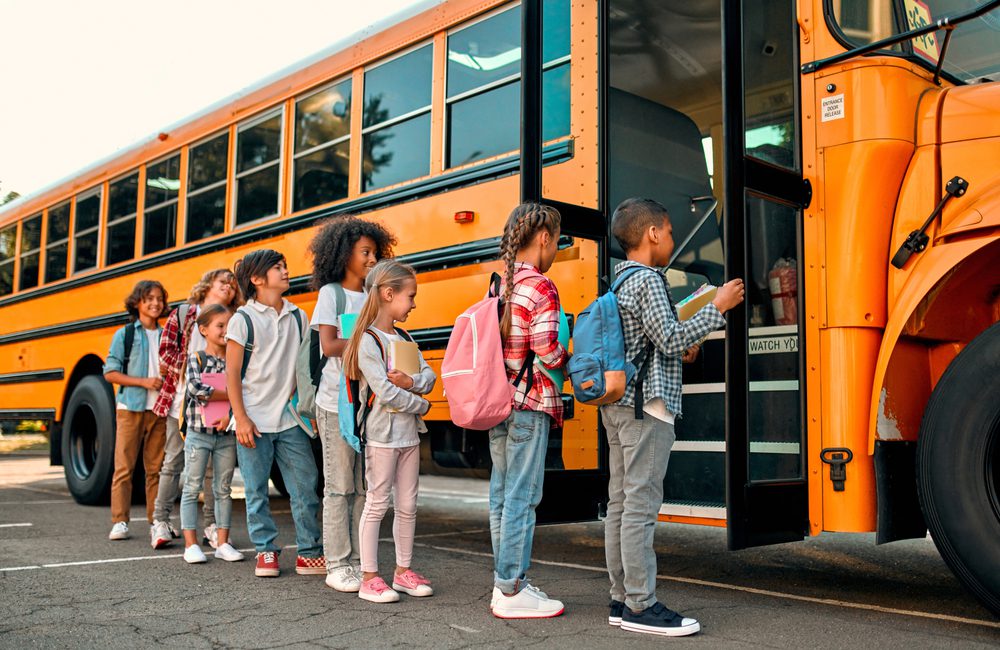
“I would love to see districts really put the public health and learning needs of all children at the forefront because teenagers who aren’t getting the sleep they need cannot learn how they are supposed to in school,” says Wendy M. Troxel, Ph.D., a senior behavioral scientist at RAND Corp. and a SleepFoundation.org medical advisory board member.
While California and Florida are the first to pass statewide laws on the subject, several other states have proposed similar mandates, and cities and school districts nationwide have implemented later start times.
But what do parents, teachers, and other school personnel think about school start times?

SleepFoundation.org polled 1,250 of them in July 2022 and found mixed sentiment. The largest batch of respondents, 38.2%, believed school start times in their area should be later. The rest are satisfied with times as they are now (36.6%) or would like them earlier (25.2%).
Diving deeper into what people think, a clearer picture may emerge about when and where we might see school start-time changes throughout the country.
Before the pandemic, more than 80% Trusted Source National Center for Education Statistics (NCES) The NCES is the primary federal entity for collecting and analyzing data related to education in the U.S. and other nations. View Source of high schools started their school days before 8:30 a.m., with the average public school beginning at 8 a.m. and 10% ringing the first bell of the day before 7:30 a.m.
That wasn’t always the case. Until a few decades ago, high school teens started their school days as late as 9 a.m. What changed? Districts began to stagger busing schedules as a cost-saving measure. Older children saw their school start times move up, with many having to wake before sunrise to get to sports practices and even classes.
For parents and educators, those early start times also became a habit. It could explain why 44.2% of parents and caregivers in SleepFoundation.org’s poll say they prefer start times to stay the same, compared to 34.7% wanting them pushed back and 21% wanting them even earlier.
Among Census regions, 42.1% adults in the Northeast preferred later starts, followed by 39% in the Midwest, 38.1% in the South, and 35.3% in the West. So maybe that habit is itching to be broken.
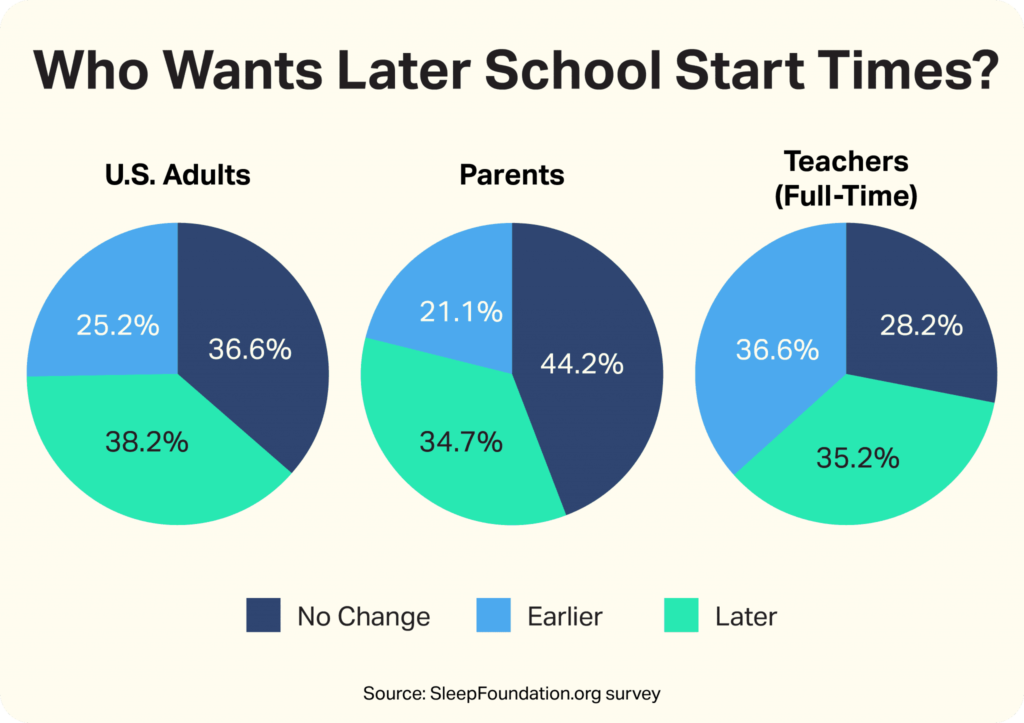
Kids need more sleep than adults. Recommendations typically say that children ages 14 to 17 should be sleeping eight to 10 hours Trusted Source National Library of Medicine, Biotech Information The National Center for Biotechnology Information advances science and health by providing access to biomedical and genomic information. View Source a night, with children ages 6 to 13 needing nine to 11 hours.
This is because our bodies, especially our brains, are developing when we go through childhood, with sleep playing a major role.
Puberty in particular shifts the internal biological clock of adolescents back two hours, Troxel says. But getting up early for school, taking on after-school activities, and finishing homework work against the change.
“Your biology wants you to stay up later and sleep in later,” Troxel says, “so teenagers are chronically sleep-deprived.”
Studies show Trusted Source Centers for Disease Control and Prevention (CDC) As the nation’s health protection agency, CDC saves lives and protects people from health threats. View Source that 31.2% of children ages 13 to 17 aren’t getting enough sleep. That increases to 37.4% of kids ages 6 to 12.
Parents say nearly the same thing, according to the SleepFoundation.org survey. Ninth- to 12-graders average 7.7 hours of sleep, their parents say, below the recommended eight hours. Some 59.5% of parents or guardians say they agreed with the statement that their kids got sufficient sleep on weeknights.
Parents of sixth- to eighth-graders say their children get 7.7 hours of sleep each school night, as well, with 63.8% considering that sufficient. Among first- to fifth-graders, that increases to an even eight hours, with 78.6% of respondents calling that sufficient.
In all, 69.2% of parents and guardians say their school-age children were getting sufficient sleep this past school year. But what about the rest?
When Andi Mannes’ 15-year-old son, Andrew, had a late start time of 8:55 a.m. on Tuesdays at Torrance High School in Torrance, California, the extra hour of sleep came in handy.
“Those mornings, [Andrew] would wake up and be just this pleasant, wonderful kid, and so excited and getting everything done with plenty of time,” Mannes says of her son, who enters his junior year in fall 2022. But: “If we have to drop him off at 7:40 [a.m.], he gets up at the very last second. He’s rushing, he’s yelling, he can’t find his shoes. It’s far more chaotic.”
It’s part of the reason behind the California and Florida laws, and others like them. Studies show that teens in schools with later start times get better sleep Trusted Source National Library of Medicine, Biotech Information The National Center for Biotechnology Information advances science and health by providing access to biomedical and genomic information. View Source .
“This is a public health issue,” says journalist Lisa L. Lewis, who campaigned for the California change and detailed her research in her book “ The Sleep-Deprived Teen .”
Based on responses from surveyed parents or caregivers who prefer later start times, the majority (81.4%) thought later starts would lead to more sleep for students, and 72.4% agreed that they’d also get more sleep themselves.
But sleep isn’t the only factor. Adjusting schedules, fitting in after-school activities, and shifting transportation needs also enter the start-time conversation. Among survey respondents who felt start times should stay the same, 53.8% felt a change would reduce after-school activities for students. The top reason for respondents who favored earlier start times was schedule fit (68.9%).
Skeptics of later school-start times exist. More male respondents to the SleepFoundation.org survey preferred earlier start times (33.6%) to later (32.5%), for example, while 43.3% of females preferred later times.
And then there are teachers. Only 35.2% of surveyed teachers favored later start times, with 36.6% choosing earlier starts.
Administrators in California were particularly vocal when the law passed there in October 2019. That’s when Orange County superintendent Al Mijares argued in CalMatters that starting the school day later is a luxury many working-class parents can’t afford: “The indisputable reality in many of our communities is that students have to begin their day at the same time as their parents.” Another California teacher called the law “a case study in ‘unintended consequences.’”
California did give schools the option of creating a “zero period” earlier in the morning to accommodate early arrivers.
Although California and Florida were the first states to approve a late-start law, these are not the first municipalities to consider it. When Seattle high schools switched to an 8:45 a.m. start time in 2016, one study Trusted Source National Center for Biotechnology Information The National Center for Biotechnology Information advances science and health by providing access to biomedical and genomic information. View Source found that students got about 34 more minutes of sleep a night. During the 2022-23 school year, Seattle high schools started at 8:50 a.m. to accommodate buses.
A decline in bus service also drove public schools in Denver to move to 8:20 a.m. start times in 2023. There appears to be a growing push for later start times in other communities. Start School Later, an organization dedicated to mandating later start times across the country, claims more than 150 volunteer-led chapters in 33 states and the District of Columbia.
Meanwhile, late-start bills are moving through other states. Representatives in Connecticut , New Jersey , New York , and the U.S. Virgin Islands have proposed mandates for later start times at public schools. Massachusetts and New Mexico have also proposed bills authorizing studies regarding school start times, and Oregon has proposed a similar measure to create a start time “task force.”
Some districts have gone the opposite direction. Kentucky’s Jefferson County Public Schools proposed testing a 9:55 a.m. start time, then scrapped the plan in 2022 after teacher and parent outcries. And Philadelphia rejected 9 a.m. starts for high schools for the coming school year because of a shortage of bus drivers, among other reasons.
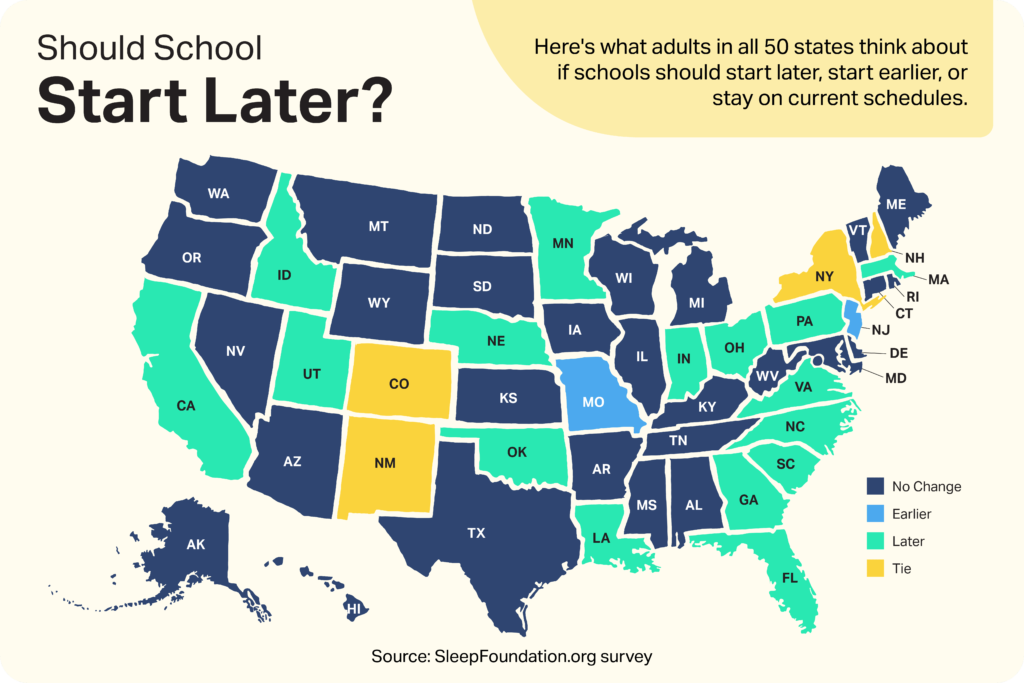
Start-time preference varies by state, according to the SleepFoundation.org survey. Twenty states came out in favor (or via a tie) of later school start times, according to their residents. These include South Carolina, whose 8:34 a.m. start time was the latest in 2020, according to the National Center for Education Statistics. Missouri and New Jersey residents preferred earlier start times. All other states had a majority leaning toward no change.
As for California: 35.6% of residents who responded to SleepFoundation.org’s survey favored later start times, compared to 32.6% wanting earlier start times and 31.9% wanting them to stay where they are.
Delaney Davis, 18, a recent graduate of Hamilton High School in Los Angeles, got a head start. Her school switched to 8:30 a.m. starts a year before the law took effect.
“It felt more productive to have that extra sleep time,” she says. “I was definitely more awake.”
The survey commissioned by SleepFoundation.org was conducted on the online survey platform Pollfish between July 20 and 21, 2022. Results are from 1,250 survey participants who were ages 18 and older; lived in the United States; and were a parent, guardian, educator, or professional/volunteer who worked with K-12 students at the time of the survey. All attested to answering the survey questions truthfully and accurately.
About Our Editorial Team

Constance Sommer, Contributing Writer
References 18 sources.
SB-328, Chapter 868. 2019, October 14, (California 2019)., Retrieved July 23, 2023 from
Sawyer, H., Taie, S., & Westat. (2020, February). Start Time for U.S. Public High Schools. The Institute of Education Sciences.
Bertsimas, D., Delarue, A., & Martin, S. (2019, March 26). Optimizing schools' start time and bus routes. Https://Doi.Org/10.1073/Pnas.181146211., Retrieved July 25, 2023, from
Hirshkowitz, M., Whiton, K., Albert, S. M., Alessi, C., Bruni, O., DonCarlos, L., Hazen, N., Herman, J., Katz, E. S., Kheirandish-Gozal, L., Neubauer, D. N., O’Donnell, A. E., Ohayon, M., Peever, J., Rawding, R., Sachdeva, R. C., Setters, B., Vitiello, M. V., Ware, J. C., & Adams Hillard, P. J. (2015). National Sleep Foundation’s sleep time duration recommendations: methodology and results summary. Sleep Health, 1(1), 40–43.
Wheaton, A. G., & Claussen, A. H. (2021). Short sleep duration among infants, children, and adolescents aged 4 months–17 years — United States, 2016–2018. Morbidity and Mortality Weekly Report (MMWR), 70(38), 1315–1321.
Alfonsi, V., Palmizio, R., Rubino, A., Scarpelli, S., Gorgoni, M., D’Atri, A., Pazzaglia, M., Ferrara, M., Giuliano, S., & De Gennaro, L. (2020). The Association Between School Start Time and Sleep Duration, Sustained Attention, and Academic Performance. Nature and science of sleep, 12, 1161–1172., Retrieved July 25, 2023, from
Dunster, G. P., de la Iglesia, L., Ben-Hamo, M., Nave, C., Fleischer, J. G., Panda, S., & de la Iglesia, H. O. (2018). Sleepmore in Seattle: Later school start times are associated with more sleep and better performance in high school students. Science advances, 4(12), eaau6200., Retrieved July 25, 2023 , from
Denver Public Schools. (2023). Healthy Start Times., Retrieved July 25, 2023 , from
Start School Later. (2023). Volunteer-Led Chapters., Retrieved July 25, 2023 , from
Proposed Bill No. 5552, LCO No. 1980. 2023, January session, (Connecticut 2023)., Retrieved July 25, 2023 , from
Bill S2462, Senate No. 2462. 2022, May 9, (New Jersey 2022)., Retrieved July 25, 2023 , from
Senate Bill 5449, Senate Education. 2023, March 6, (New York 2023)., Retrieved July 25, 2023 , from
Bill No. 33-0196, Thirty-Third Legislature of the Virgin Islands. 2019, September 20, (U.S. Virgin Islands 2019)., Retrieved July 25, 2023 , from
Resolve H.3980, 192nd General Court. 2021, July 21, (Massachusetts 2021)., Retrieved July 25, 2023 , from
HM 56, 56th Legislature. 2023, February 17, (New Mexico 2023)., Retrieved July 25, 2023 , from
House Bill 2751, 82nd Legislative Assembly. 2023, (Oregon 2023)., Retrieved July 25, 2023 , from
Krauth, O. (2022, March 9). After educator outcry, JCPS to revisit idea to change start times at alternative schools. Courier Journal., Retrieved July 25, 2023 , from
Mezzacappa, D. (2022, May 25). Philly backtracks on planned 9 a.m. high school start time. Chalkbeat Philadelphia., Retrieved July 25, 2023 , from
Learn More About Sleep News

Gallup Poll Shows US Adults Are More Stressed and Sleep Deprived Than Ever Before

Your Side Hustle Could Be Impacting Your Sleep Health

Researchers Develop New Seal-Less CPAP Mask

New Research Shows Infant Gut Bacteria Has Its Own Circadian Rhythm

Study Finds Microdosing LSD May Enhance Sleep

Researchers Unveil Innovative Sensor to Detect Sleep Apnea

46% of People with Below-Average Sleep Quality Rate Their Mental Health As Poor

Philips Reaches $1.1B Settlement Over Defective CPAP Machines

Oura Launches New Crowdsourcing Research Platform for Its Popular Smart Ring App

Could Bird Brains Shed Light on Sleep Disorders?

Can a Weight-Loss Drug Treat Sleep Apnea on Its Own?

Daytime Brain Wave Patterns May Explain How Memories Are Stored During Sleep

Study Finds Racial Disparities in Childhood Insomnia That Persist Among Young Adults

Supreme Court to Hear Case on Public Sleeping Ban

Greener Streets and Water Views May Improve Sleep

Does Tying a Sweatshirt Around Your Head Help You Sleep?

Sleeping Less Than 7 Hours Per Night Linked to Higher Risk of Death in People With Sleep Apnea

Congressional Watchdog Says Military Service Members Aren't Getting Enough Sleep

Study Links Bed Sharing to Higher Rate of Sudden Unexpected Infant Deaths

Accidental Melatonin Overdoses by Kids Leads to Sharp Spike in ER Visits

Listening to Calming Words While Asleep Boosts Deep Sleep

Want To Sleep Better? Move Your Body More.

Researchers Develop Blood Test to Detect Sleep Deprivation

Stroke Risk Due to Sleep Apnea May Differ Among White and Black People

New Study Finds Link Between Short Sleep and Diabetes

77% of Young Adult Vape Users Report Insomnia Symptoms

Pilots Falling Asleep and Veering Off Course Spotlights Drowsy Flying

How Does Your Sleep Change With a New Mattress?

Service Dogs Help Autistic Kids Sleep Better

People On Plant-Based Diets Sleep Up to 48 More Minutes Per Night

Grounding Sheets: Does Channeling Earth’s Energy Help You Sleep Better?

Plant-Based Diet Lowers Risk of Obstructive Sleep Apnea

March Madness Might Be a Gamble On Your Sleep

Can the Rise of Chronoworking Help Fix Our Sleep?

New Data Show Widespread Problems of Short Sleep and Social Jetlag

The Windowless Bedroom Debate Heats Up

AI Program Shows Promise In Predicting Health Risks From Sleep Apnea

Despite Disturbing Each Other's Sleep, Mice Refuse Sleep Divorces

The Sleep Gender Gap: Nighttime Disparities Between Women and Men

Latest Updates: Daylight Saving Time in 2024

Study Finds Bedtime Procrastination Impacts Sleep Quality

How Pumping Up with Steroids Can Deflate Sleep

Say We Abolished Daylight Saving Time. Here’s How It Would Change Sleep.

What Does the Hurkle-Durkle TikTok Trend Do for Your Sleep?

New Study Finds Post-COVID Insomnia is Common Even Among Mild Cases

Medical Clowns Help Kids in Hospitals Sleep Better

New Research Highlights Problems With Polyphasic Sleep

Can You Catch All Your ZZZs with Pokémon Sleep App?

Only Murders While You're Sleeping: The Parasomnia Defense
New Study Finds Work-Sponsored Program Boosts Sleep and Productivity

When Your Partner Snores, No One Sleeps

Police Killings of Unarmed Black People Impact Sleep Health of Black Community

Samsung Watch Sleep Apnea Feature First Ever Approved by FDA
New Research Evaluates Accuracy of Sleep Trackers

Hotels Go Beyond Sleep Tourism to Offer Sleep Studies

You Can Have Your Super Bowl and Your Sleep Too

Purdy vs. Mahomes: Which Super Bowl LVIII QB Has Better Sleep Habits?

New Studies Link Sleep Problems and Hearing Loss

New Study Suggests Sleep Resets the Brain Like a Computer

Philips to Stop Selling Sleep Apnea Machines in US After Recall Problems
2024 Projected to Be Biggest Year Yet for Sleep Industry

New Sleep Mask Benefit Unlocked: Improved Brain Function

The Best & Worst U.S. Cities for Sleep

Sleepy Girl Mocktails Are Trending But Do They Really Help You Sleep Better?


Could Seizures Be Behind Children's Sudden Unexplained Deaths During Sleep?

As Flu and COVID-19 Cases Spike, Safeguard Your Sleep

New Study Finds That the Wavelength of Light, Not Color, Impacts Sleep

New Study Shows CPAP Therapy Can Aid Memory Processes in the Brain

If Opening a Window Leads to Better Sleep, Why Don't We Do It?

Evaluating ChatGPT's Potential in Sleep Education and Beyond

Can New Weight Loss Drugs Improve Sleep?

Thinking About a Dry January? 61% Say They Sleep Better For It.

10 New Year's Resolutions That Can Improve Your Sleep But a Third of People Never Try

FDA Clears First Oral Appliance for Severe Sleep Apnea

The Year in Sleep: 37% of Us Slept Worse in 2023

FDA Warns Certain Philips CPAP Machines May Overheat and Cause Injuries

Researchers Harness AI and Other Innovations to Detect Sleep Apnea

The Unexpected Impact of Caffeine and Alcohol on Sleep

Is Cannabis More Effective Than Other Sleep Aids?

Being Compassionate May Help You Sleep Easier At Night

77% of Us Lose Sleep Over Financial Worries. How Do We Earn It Back?

Do Your Children Have Trouble Sleeping? It Could Be in Their Genes

New Feature for 2024 Apple Watch Reportedly Detects Sleep Apnea

Sleep Deprivation Can Take a Big Toll on Your Heart and Brain

Drowsy Driving Is a Factor in 21% of Fatal Crashes. Why Don't We Talk About It More?

Health and Safety Concerns Cited as Top Priority in New Daylight Saving Time Survey

How Bedroom Temperatures and Bedding Choices Impact Your Sleep

Sleep Like the Candidates: How Politicians Rest on the Campaign Trail

New Study Shows What's in Your Gut Influences How and When You Sleep

Hitting the Snooze Button May Actually be Good for You

New Study Says Bedtime Routines are Part of Our Survival Instinct

Why Spooky Season Can be Frightful for Kids' Sleep

Teens' Depression Improves With Therapy That Targets Natural Sleep Patterns

Astronauts Launch Study on the Effects of Long Spaceflights on Sleep

For Young Workers, Insomnia Accounts for Four Weeks of Lost Productivity a Year

94% of Us Drink Caffeinated Beverages. But What Does it do to Our Sleep?

Nearly Half of Parents Give Their Kids Melatonin for Sleep

Clinical Trials Evaluate Experimental Drugs for Sleep Apnea

Breathing Fragrances While Sleeping Boosts Memory and Learning

Experts Develop Sleep Guidelines Uniquely Designed For Shift Workers

Our Brains Can Age as Much as Two Years With No Sleep for 24 Hours

Good Sleep Linked to Longer Life

Study Shows Keto Diet Can Help You Sleep Better

When Wildfires Burn, We Lose 1.5 Hours of Sleep Each Night

Social Media Dominates Pre-Bedtime Routine for U.S. Adults, Survey Finds

Hidden Sleep Crisis: Unhoused Americans Struggle For Their Health

Maternity Care Deserts: Home to Sleepless Nights, Exhausted Days

Searching For Sleep Solutions When Working From Home

Can't Eat, Can't Sleep: Rest Doesn't Come Easy in a Food Desert

Fewer Than 2% Of Adults Are in a Sleep Divorce. But Do They Sleep Better?

How Often Do We Eat Before Bed, and How Bad Is It for Us?
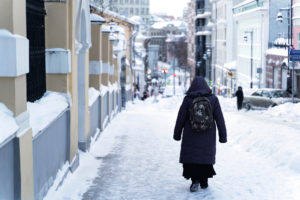
We Actually Sleep 10 More Minutes When It Snows

Melatonin Searches Spike Every Winter

Why Can't Hawaii Sleep? And What Makes the Top States For Sleep So Good?

Painsomnia Steals 51.5 Minutes of Our Sleep Every Night. How Do We Cope?

For 70%+ of Us, Sleep Habits Run in the Household

How Gamers Actually Sleep

It Ain’t the Turkey: We Lose 11 Minutes of Sleep on Thanksgiving

Do We Lose Sleep to Seasonal Affective Disorder?

We May Be Showering All Wrong, at Least When It Comes to Sleep

What Do We Really Think About Adults Who Sleep In?

How Much Melatonin Do We Really Take?

Who's Napping, How Long, and What Does It Mean for Our Health?

Sleep Apnea May Increase Risk of COVID-19 Severity

One-Third of Us Lose Sleep to the 'Sunday Scaries.' Here's How To Get It Back

Having Your Own Room as a Kid May Be Worth 28 Minutes of Sleep

Saving Lives and Losing Sleep? How Nurses' Sleep Has Changed Since COVID-19

Untangling the Web of Babies' Sleep, Moms' Sleep, and Depression

The Structural Inequality of Sleep: An Interview With Dr. Dayna Johnson

Do We Sleep Better in Airbnbs or Hotels?

Sleep Inequity Takes Center Stage in SIDS Recommendations

Why Are We All Still Watching TV Right Before Bed?

New Rules May Change the Game For Some Baby Sleep Products

Older Adults May Improve Deep Sleep With Noise

Raising a Rested Child: An Interview with Dr. Chris Winter

Lifting Weights May Help You Sleep Better Than Cardio

Noise During Sleep Affects Your Heart, Study Finds

Fostering Sleep in the Family: An Interview With Dave Gibson

FDA Warns Against Certain At-Home Cleaners for Your CPAP Machine

Wildfires and Smoke: How to Protect Your Sleep

An Education Gap Is the Sleep Gap: an Interview With Dr. Connor Sheehan
Can Tracking Your Child’s Sleep Give a Look Into Their Upcoming Day?

Sleep Is Social: An Interview With Dr. Wendy Troxel

New Study Shows Insomnia More Common in COVID-19 Survivors
Other articles of interest, sleep deprivation, bedroom environment, sleep hygiene.
- Newsletters
- Environment
- 2024 Voter Guide
- Digital Democracy
- Daily Newsletter
- Data & Trackers
- California Divide
- CalMatters for Learning
- College Journalism Network
- What’s Working
- Youth Journalism
- Manage donation
- News and Awards
- Sponsorship
- Inside the Newsroom
- CalMatters en Español
Later school start times is no solution for teenagers
Share this:
- Click to share on X (Opens in new window)
- Click to share on Facebook (Opens in new window)
- Click to share on WhatsApp (Opens in new window)

By Al Mijares, Orange County Superintendent of Schools
Al Mijares is Orange County Superintendent of Schools, [email protected] . He wrote this commentary for CalMatters.
Editor’s note: This commentary is in response to: “ A trifecta for children? ” Dan Walters, Sept. 30, 2019.
As educators, we are always looking to improve the well-being and success of each of our students. In his column, Dan Walters opines that Senate Bill 328 furthers that goal by mandating later start times for middle and high school classes.
It may be true that students with better sleep patterns can be more successful, and, let’s face it, we all want our kids to be well-rested as they start their days.
Yet a multi-year study in the research journal SLEEP and findings from researchers at the UC Davis Sleep Laboratory challenge the argument that students would get persistent benefits from a shift in their school start time.
Not only would mandating a later start time across the board not have the desired effect, it would impose a hardship on too many working families. In fact, this bill would disproportionately burden students whose socio-economic status is already a significant educational barrier.
While it may be easy enough for some families with flexible schedules to adjust, in some communities, parents who are working just to make ends meet don’t have the luxury of delaying the start of their workday.
The indisputable reality in many of our communities is that students have to begin their day at the same time as their parents.
These children are already arriving early to school if their parents are commuting, are farmworkers, or work in construction, restaurants or retail. Even with later start times, many of these parents will still have to drop their kids off at school before they go to work.
These students won’t be getting any more sleep, and the additional idle unsupervised time alone could put them in danger. Parents shouldn’t have to choose between keeping their jobs and ensuring the safety of their children.
And this doesn’t take into account the back end of the school day, when many families rely on older siblings to look after younger children. SB 328 by Sen. Anthony Portantino, Democrat from La Cañada Flintridge, would also push after-school activities later into the evenings.
In California, 45% of children live in low-income households and 46% of those families are single-parent families. The idea that SB 328 will not harm any students ignores the real-world constraints under which working-class families and single parents operate.
I am disappointed that Mr. Walters falls into the trap of characterizing arguments against SB 328 as adult “convenience above the welfare of the children they are supposed to be educating.”
Maybe he assumes that every community has the means to adjust their work schedules. Perhaps a few can, but certainly not all. And each community is in a better position than the state to decide what is best for local students and their parents.
We want to hear from you
Want to submit a guest commentary or reaction to an article we wrote? You can find our submission guidelines here . Please contact CalMatters with any commentary questions: [email protected]
15 Reasons Why School Should Start Earlier (Top Benefits!)
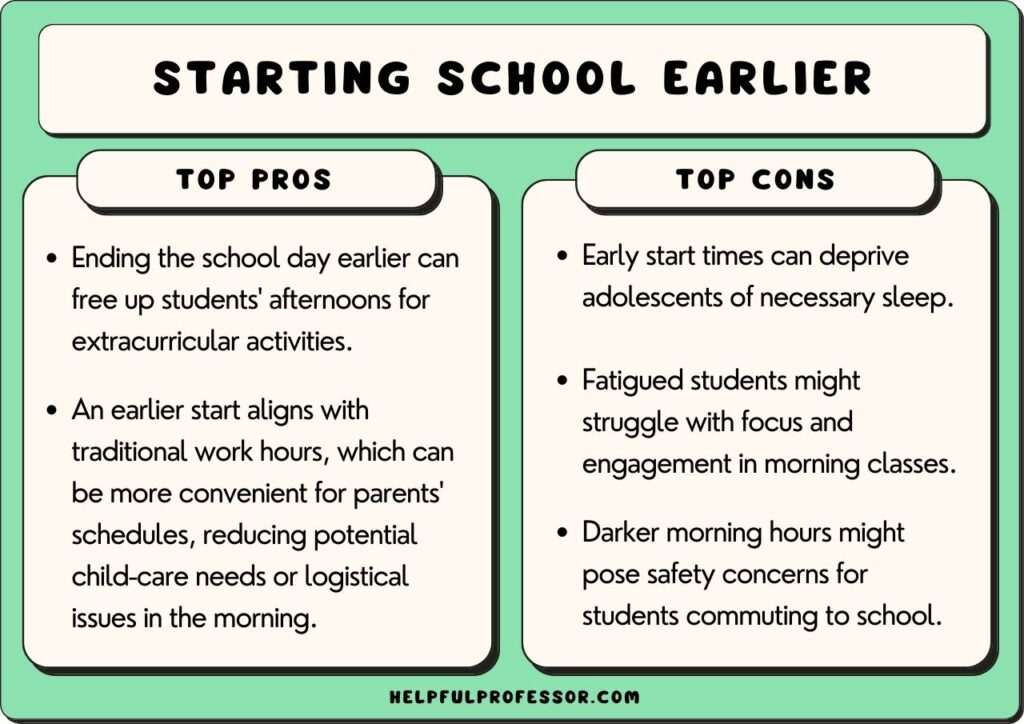
The debate over school start times often focuses on the many reasons school should start later . However, there are plenty of debate arguments for why school should actually start earlier.
Here are 10 possible reasons why schools should stick with an earlier start time.
- Cuts transportation costs
- Gets students to school faster
- Has benefits for work schedules
- Lets districts pool resources more effectively
- Allows more free time
- Creates academic advantages
- Is safer for travel
- Allows for afterschool jobs
- Establishes a routine
- Prompts a healthy lifestyle
- There are no clear benefits of starting later
- Students don’t see their parents as much
- Allows time for after-school sports
- Negates the need for daylight savings time
- Allows teachers to do more with their day
Starting earlier has benefits for kids of all ages and serves the additional purpose of saving the school district a good amount of money. The rest of this article will discuss the benefits of starting school early.
Get a Pdf of this article for class
Enjoy subscriber-only access to this article’s pdf
Reasons Why School should Start Earlier
1. early start times cost less for schools.
One of the main reasons schools haven’t instituted later start times is the associated costs.
For example, Greenwich school district conducted studies into pushing back start times after reading the evidence supporting later start times. However, they found that any scenario would lead to increased costs. Here was one key finding:
“Pushing every school’s start back by 30 minutes to 90 minutes would involve between 10 and 19 extra buses, requiring an additional outlay each year from approximately $760,000 to some $1.5 million.”
Similarly, staggered bus routes – where high schools start earlier and elementary schools stay the same – would lead to more time for the busses to complete their routes, but would increase costs for insurance, fuel, and wages for drivers.
2. Students can Skip the Traffic
As well as saving the school money on fuel, early morning start times help to avoid the traffic.
Avoiding traffic has abundant benefits. For one thing, it will mean there is less of a chance that the busses and cars will get caught in traffic jams, meaning students will theoretically turn up to class on time more often.
This does, of course, assume that students will make it to the earlier bus and not accidentally sleep in.
However, keep in mind that if everyone starts driving on the roads earlier to get their kids to school, the traffic may shift with the changes in school times, negating this benefit.
3. Has Benefits for Work Schedules
Another good benefit of starting school earlier is that it can blend more effectively with parents work schedules.
For students who can’t be left unattended, parents have to pay out of pocket for daycare or babysitting services if they leave the house well before their child is picked up for school.
An earlier start could mean that parents can get the students to school and then get on with their days – going to work, doing early shopping, and so forth.
Of course, the downside here is that an early start time may lead to an early ending time, which just pushes back the scheduling clashes into the afternoon.
4. It Lets Districts Pool Resources More Effectively
There’s always a need for good bus drivers, and sharing buses is common practice in a school district.
Unfortunately, buses are expensive to run and can only be used for one route at a time. Starting earlier in the morning, particularly for grade students, allows busses to be available for picking up students who have later start times.
If all students began at the same time, the district would need to have buses and drivers available to meet the demand for all those students at the same time.
By giving grade school students an earlier start, the rest of the district has transportation resources available for students.
However, as noted earlier, this would also be associated with higher costs for transit.
5. Allows More Free Time
Between school, jobs, and team practices, students today are swamped with work. This leads to the concept of the over-scheduled child .
While starting early might be a bit of a bummer for them, doing so ensures that they finish earlier, too, allowing them to pursue afterschool activities, manage homework, and still enjoy their free time without feeling like they have no personal time.
By giving children more free time, they may in fact get time to play, be creative, and potentially even get more sleep (Glauser, 2018).
6. You Get More into the Day
Starting early means you can fit more into your day. And while adults often burn out part-way through the day, adolescents can power through well into the afternoon.
As a result, by sending children to school early, we can get them to fit more into their days, and even potentially open up debates about having 4-day school weeks.
This reasoning is likely why schools do start so early, with 93% of high schools and over 80% of middle schools starting prior to 8:30a.m.
(Note: For a counterargument , consider the abundance of evidence showing school-age children’s brainpower is best around mid-morning – see: Dikker et al., 2020).
7. Is Safer for Travel
People advocating for later school starts often point out that sleep deprivation makes early morning driving dangerous for teenagers (Taheri & Arabameri, 2012).
While this evaluation is correct, it doesn’t consider the other side of the proverbial coin: later commutes home from work are also dangerous, especially in urban environments.
Starting school earlier may be able to give students space to drive to and from school with less traffic which could make the streets safer.
8. Allows for Afterschool Jobs
For high school students preparing for the future, an afterschool job is a major part of growing their savings early.
Schools that start earlier are usually finished in time for high school students to pick up a part time job in their local area.
Not only does a job earn them valuable money for college, but it also teaches them discipline and responsibility in a work environment.
9. Establishes a Routine
Establishing a routine is difficult as an adult, much less as a child, but for students of all ages, establishing an “early to bed, early to rise” mentality has numerous health benefits .
It enables students to mentally prepare themselves for the day and set up a routine to transition into adulthood.
Getting up early ensures that students are ready for a bed at a decent time, avoiding some risky situations often associated with detrimental behavior.
10. Prompts a Healthy Lifestyle
Schools starting earlier not only helps students establish a morning routine, but it also benefits their lifestyle as whole.
Students who adapt to getting up early, preparing for the day, and balancing their daily schedule are more prepared for adulthood.
Creating a healthy school-life balance by understanding what’s expected of them, tackling homework, and participating in extra-curricular activities translates to a healthy work-life balance in the future.
11. There’s no Clear Benefit to Starting Later
While there is some scattered evidence of making school start times later, the most extensive systematic review on this topic found there isn’t enough evidence to make start times later.
In other words, if you’re debating the topic of school start times and you’re on the side of earlier start times, make sure you argue at least the point that there’s no need to make start times later.
As Marx et al. (2017, p. 10) argue in their systematic review:
“We cannot be confident about the effects of later school start times.”
Therefore, there needs to be much clearer and far less biased studies on school start times before making school start times later.
12. Students may see their parents more
A study (Hinrichs, 2011) of schools that start later found that late start times lead to less interaction between children and their parents.
The study found:
“…later school start times may be associated with decreased morning interactions between parents and children.” (Marx et al., 2017, p. 43)
An earlier start time, on the other hand, may lead to more interaction because the parents and children will have more evening and afternoon time to spend together.
Here, the assumption is that late start times just mean the children sleep in; while early start times mean the children get up, get their day done, and then can spend some time with their families.
13. Allows time for after-school developmental activities
If school starts earlier and ends earlier, then society can start structuring after-school activities for children that allow for holistic development of children.
This may include structuring mid-afternoon sessions for children’s development in sporting, play, creative, artistic, and musical pursuits.
We could envisage a world where formal schooling ends and students go on to structured activities of their choice associated with pursuing their creative or sporting interests. This may help to raise a society that’s not just focused on academic standards, but also a more holistic experience of the diverse range of human pursuits.
14. Negates the need for daylight savings time
The rationale for daylight savings time is to allow people to have one extra hour of light in the evening during summer.
There is ample debate about the value of daylight savings time. But if students started and ended school earlier, then there wouldn’t be a need to squeeze an extra hour of sunlight into the day for children’s activities.
As a result, we can reduce one more argument about the benefits of daylight savings time.
15. Allows teachers to do more with their day
If teachers can finish their day of work by 2pm, they could schedule extra things into their afternoons.
At the moment, teachers spend their nights preparing classes for the next day. This can make their work-life balance very poor.
But if teachers finish their school day by 2pm, they can spend the next 3 hours preparing their next day’s classes and not bring school work home with them. This will increase their time with their families in the evenings.
Furthermore, as a teacher, I get frustrated that I can never book appointments at the bank or with the dentist because I am always working when they were open. But if I can get off work at 2pm, I can finally get to those appointments.
Transitioning to an early schedule can be challenging for many students, but at the end of the day, it’s often a decision made to benefit the school district as a whole.
Cutting back on transportation costs, pooling resources, and staggering busloads to and from school are some of the main reasons that schools, particularly grade schools, start so early in the morning.
Dikker, S., Haegens, S., Bevilacqua, D., Davidesco, I., Wan, L., Kaggen, L., … & Poeppel, D. (2020). Morning brain: real-world neural evidence that high school class times matter. Social cognitive and affective neuroscience , 15 (11), 1193-1202.
Glauser, W. (2018). Overscheduled and glued to screens—children are sleeping less than ever before. Canadian Medical Association Journal, 190 (48). DOI: https://doi.org/10.1503/cmaj.109-5676
Hinrichs, P. (2011). When the bell tolls: The effects of school starting times on academic achievement. Education Finance and Policy , 6 (4), 486-507.
Marx, R., Tanner‐Smith, E. E., Davison, C. M., Ufholz, L. A., Freeman, J., Shankar, R., … & Hendrikx, S. (2017). Later school start times for supporting the education, health, and well‐being of high school students: a systematic review. Campbell Systematic Reviews , 13 (1), 1-99.
Taheri, M., & Arabameri, E. (2012). The effect of sleep deprivation on choice reaction time and anaerobic power of college student athletes. Asian journal of sports medicine, 3 (1), 15.

Chris Drew (PhD)
Dr. Chris Drew is the founder of the Helpful Professor. He holds a PhD in education and has published over 20 articles in scholarly journals. He is the former editor of the Journal of Learning Development in Higher Education. [Image Descriptor: Photo of Chris]
- Chris Drew (PhD) https://helpfulprofessor.com/author/chris-drew-phd/ 15 Self-Actualization Examples (Maslow's Hierarchy)
- Chris Drew (PhD) https://helpfulprofessor.com/author/chris-drew-phd/ Forest Schools Philosophy & Curriculum, Explained!
- Chris Drew (PhD) https://helpfulprofessor.com/author/chris-drew-phd/ Montessori's 4 Planes of Development, Explained!
- Chris Drew (PhD) https://helpfulprofessor.com/author/chris-drew-phd/ Montessori vs Reggio Emilia vs Steiner-Waldorf vs Froebel
4 thoughts on “15 Reasons Why School Should Start Earlier (Top Benefits!)”
This is so wrong on every level. 1. Sleep is known to be a very important part in learning new things. If students don’t get enough sleep, they wouldn’t be able to learn as effectively, therefore making schools much less effective than they could be. If your argument to that is “student can go to sleep earlier so they get more sleep” you are wrong for the following reasons: A. If they go to sleep earlier, they have less free time(because their day ends earlier). I don’t understand how this one fact gets ignored by literally everyone. B. Sleeping doesn’t work that way. You can’t just fall asleep whenever you want. To fall asleep, you need this hormone called melatonin. This hormone is not produced at will whenever you want to go to sleep. I guess you never understood biology, otherwise you would know that reflexive actions you body does aren’t always up to conscious decisions we make. And some people(like me) are not affected by melatonin pills. C. Insomnia is a thing that exists in some students. For people with insomnia, falling asleep is even harder than it is for most people. So unless schools want to discriminate against insomniacs, they should not expect everyone to come early. D. Since student need sleep to learn better, they probably won’t need as many lessons in each subject every week, making the school shorter(because there are less classes). Though I am not so sure that schools would notice this if it happened. 2. After-school activities would be moved forward if schools ended later. Because that’s when students would be available. In fact, those who participate would probably preform better, since they would be less tired. This seemed pretty obvious to me, but I guess you never thought about it, since you didn’t mention it. 3. Daily routines don’t have to start in the early morning, and a healthy lifestyle doesn’t have to include waking up and going to be early. In fact, it’s probably unhealthy, since sleeping in the natural time when you feel tired is much better for your health than trying to force yourself to fall asleep to early and forcing yourself to wake up with an alarm clock. 4. Those who want to get up early still can, and they can have some free time in the morning before school, at home. As you can probably imagine, waking up and immediately having to get ready quickly to get to school on time is not a pleasant experience. Especially if you woke up late. So starting school later can make morning a lot less stressful.
I think these are plenty of good reasons for schools to start later. Fact: Finland’s education system is the best in the world, and they start later and end pretty quickly, so some of my points actually exist in real life, and show results.(not to say that starting late and finishing early is the main factor in Finland’s education system’s success, but that it obviously isn’t harmful to the students’ school lives, and that they don’t hate school.)
I hope you actually understood that there are plenty of good reasons to move school starting times forward, and that you understand that most people hate waking up early. Though adults do need to wake up early, the same standard should be held against children and adolescents, who’s brains are still developing and need sleep the most.

Good points Yael. The points presented in the article are possible debate points for students to critically engage with, not necessarily gospel… we also have a complementary article presenting some of your arguments against starting school earlier, that is linked to within this piece.
Thanks I needed this for my ap psych assignment
I agree. I am currently doing an assignment in school on why school start times should be changed. One of the biggest reasons I have found is that when teenagers hit puberty their body goes through something called phase delay. This is where their circadian rhythms shift back by about two hours. This means that most teenagers can’t fall asleep until 11pm.
Leave a Comment Cancel Reply
Your email address will not be published. Required fields are marked *
24/7 writing help on your phone
To install StudyMoose App tap and then “Add to Home Screen”
School Should Start Later
Save to my list
Remove from my list

- Stanford Magazine - Solving the Snooze Button Epidemic
- Sleep Foundation - Teens and Sleep

School Should Start Later. (2016, Feb 26). Retrieved from https://studymoose.com/school-should-start-later-essay
"School Should Start Later." StudyMoose , 26 Feb 2016, https://studymoose.com/school-should-start-later-essay
StudyMoose. (2016). School Should Start Later . [Online]. Available at: https://studymoose.com/school-should-start-later-essay [Accessed: 8 Jun. 2024]
"School Should Start Later." StudyMoose, Feb 26, 2016. Accessed June 8, 2024. https://studymoose.com/school-should-start-later-essay
"School Should Start Later," StudyMoose , 26-Feb-2016. [Online]. Available: https://studymoose.com/school-should-start-later-essay. [Accessed: 8-Jun-2024]
StudyMoose. (2016). School Should Start Later . [Online]. Available at: https://studymoose.com/school-should-start-later-essay [Accessed: 8-Jun-2024]
- Starting School Later: Why Should School Start Later Pages: 2 (536 words)
- Why School Should Start Later? Pages: 2 (396 words)
- Should School Day Start Later? Pages: 3 (634 words)
- Reasons Why School Should Start Later Pages: 3 (724 words)
- School Should Start Later: The Benefits And Advantages Pages: 3 (864 words)
- Why Secondary Schools Should Start Later in Hong Kong Pages: 5 (1358 words)
- Teen Sleep: Why Schools Should Start Later - Wendy Troxel TED Talk Pages: 2 (480 words)
- Why Do Schools Should Begin Later In Mornings Pages: 3 (631 words)
- School Starting Later: Reasons For This Proposal Pages: 4 (974 words)
- Rethinking School Start Times: Health and Success Pages: 5 (1245 words)

👋 Hi! I’m your smart assistant Amy!
Don’t know where to start? Type your requirements and I’ll connect you to an academic expert within 3 minutes.
- Grades 6-12
- School Leaders
NEW: Classroom Clean-Up/Set-Up Email Course! 🧽
The Big List of Essay Topics for High School (120+ Ideas!)
Ideas to inspire every young writer!

High school students generally do a lot of writing, learning to use language clearly, concisely, and persuasively. When it’s time to choose an essay topic, though, it’s easy to come up blank. If that’s the case, check out this huge round-up of essay topics for high school. You’ll find choices for every subject and writing style.
- Argumentative Essay Topics
- Cause-and-Effect Essay Topics
- Compare-Contrast Essay Topics
- Descriptive Essay Topics
- Expository and Informative Essay Topics
- Humorous Essay Topics
Literary Essay Topics
- Narrative and Personal Essay Topics
- Personal Essay Topics
- Persuasive Essay Topics
Research Essay Topics
Argumentative essay topics for high school.
When writing an argumentative essay, remember to do the research and lay out the facts clearly. Your goal is not necessarily to persuade someone to agree with you, but to encourage your reader to accept your point of view as valid. Here are some possible argumentative topics to try. ( Here are 100 more compelling argumentative essay topics. )
- The most important challenge our country is currently facing is … (e.g., immigration, gun control, economy)
- The government should provide free internet access for every citizen.
- All drugs should be legalized, regulated, and taxed.
- Vaping is less harmful than smoking tobacco.
- The best country in the world is …
- Parents should be punished for their minor children’s crimes.
- Should all students have the ability to attend college for free?
- Should physical education be part of the standard high school curriculum?

WeAreTeachers
- Schools should require recommended vaccines for all students, with very limited exceptions.
- Is it acceptable to use animals for experiments and research?
- Does social media do more harm than good?
- Capital punishment does/does not deter crime.
- What one class should all high schools students be required to take and pass in order to graduate?
- Do we really learn anything from history, or does it just repeat itself over and over?
- Are men and women treated equally?
Cause-and-Effect Essay Topics for High School
A cause-and-effect essay is a type of argumentative essay. Your goal is to show how one specific thing directly influences another specific thing. You’ll likely need to do some research to make your point. Here are some ideas for cause-and-effect essays. ( Get a big list of 100 cause-and-effect essay topics here. )
- Humans are causing accelerated climate change.
- Fast-food restaurants have made human health worse over the decades.
- What caused World War II? (Choose any conflict for this one.)
- Describe the effects social media has on young adults.

- How does playing sports affect people?
- What are the effects of loving to read?
- Being an only/oldest/youngest/middle child makes you …
- What effect does violence in movies or video games have on kids?
- Traveling to new places opens people’s minds to new ideas.
- Racism is caused by …
Compare-Contrast Essay Topics for High School
As the name indicates, in compare-and-contrast essays, writers show the similarities and differences between two things. They combine descriptive writing with analysis, making connections and showing dissimilarities. The following ideas work well for compare-contrast essays. ( Find 80+ compare-contrast essay topics for all ages here. )
- Public and private schools
- Capitalism vs. communism
- Monarchy or democracy
- Dogs vs. cats as pets

- Paper books or e-books
- Two political candidates in a current race
- Going to college vs. starting work full-time
- Working your way through college as you go or taking out student loans
- iPhone or Android
- Instagram vs. Twitter (or choose any other two social media platforms)
Descriptive Essay Topics for High School
Bring on the adjectives! Descriptive writing is all about creating a rich picture for the reader. Take readers on a journey to far-off places, help them understand an experience, or introduce them to a new person. Remember: Show, don’t tell. These topics make excellent descriptive essays.
- Who is the funniest person you know?
- What is your happiest memory?
- Tell about the most inspirational person in your life.
- Write about your favorite place.
- When you were little, what was your favorite thing to do?
- Choose a piece of art or music and explain how it makes you feel.
- What is your earliest memory?

- What’s the best/worst vacation you’ve ever taken?
- Describe your favorite pet.
- What is the most important item in the world to you?
- Give a tour of your bedroom (or another favorite room in your home).
- Describe yourself to someone who has never met you.
- Lay out your perfect day from start to finish.
- Explain what it’s like to move to a new town or start a new school.
- Tell what it would be like to live on the moon.
Expository and Informative Essay Topics for High School
Expository essays set out clear explanations of a particular topic. You might be defining a word or phrase or explaining how something works. Expository or informative essays are based on facts, and while you might explore different points of view, you won’t necessarily say which one is “better” or “right.” Remember: Expository essays educate the reader. Here are some expository and informative essay topics to explore. ( See 70+ expository and informative essay topics here. )
- What makes a good leader?
- Explain why a given school subject (math, history, science, etc.) is important for students to learn.
- What is the “glass ceiling” and how does it affect society?
- Describe how the internet changed the world.
- What does it mean to be a good teacher?

- Explain how we could colonize the moon or another planet.
- Discuss why mental health is just as important as physical health.
- Describe a healthy lifestyle for a teenager.
- Choose an American president and explain how their time in office affected the country.
- What does “financial responsibility” mean?
Humorous Essay Topics for High School
Humorous essays can take on any form, like narrative, persuasive, or expository. You might employ sarcasm or satire, or simply tell a story about a funny person or event. Even though these essay topics are lighthearted, they still take some skill to tackle well. Give these ideas a try.
- What would happen if cats (or any other animal) ruled the world?
- What do newborn babies wish their parents knew?
- Explain the best ways to be annoying on social media.
- Invent a wacky new sport, explain the rules, and describe a game or match.

- Imagine a discussion between two historic figures from very different times, like Cleopatra and Queen Elizabeth I.
- Retell a familiar story in tweets or other social media posts.
- Describe present-day Earth from an alien’s point of view.
- Choose a fictional character and explain why they should be the next president.
- Describe a day when kids are in charge of everything, at school and at home.
Literary essays analyze a piece of writing, like a book or a play. In high school, students usually write literary essays about the works they study in class. These literary essay topic ideas focus on books students often read in high school, but many of them can be tweaked to fit other works as well.
- Discuss the portrayal of women in Shakespeare’s Othello .
- Explore the symbolism used in The Scarlet Letter .
- Explain the importance of dreams in Of Mice and Men .
- Compare and contrast the romantic relationships in Pride and Prejudice .

- Dissect the allegory of Animal Farm and its relation to contemporary events.
- Interpret the author’s take on society and class structure in The Great Gatsby .
- Explore the relationship between Hamlet and Ophelia.
- Discuss whether Shakespeare’s portrayal of young love in Romeo and Juliet is accurate.
- Explain the imagery used in Beowulf .
Narrative and Personal Essay Topics for High School
Think of a narrative essay like telling a story. Use some of the same techniques that you would for a descriptive essay, but be sure you have a beginning, middle, and end. A narrative essay doesn’t necessarily need to be personal, but they often are. Take inspiration from these narrative and personal essay topics.
- Describe a performance or sporting event you took part in.
- Explain the process of cooking and eating your favorite meal.
- Write about meeting your best friend for the first time and how your relationship developed.
- Tell about learning to ride a bike or drive a car.
- Describe a time in your life when you’ve been scared.

- Share the most embarrassing thing that ever happened to you.
- Tell about a time when you overcame a big challenge.
- Tell the story of how you learned an important life lesson.
- Describe a time when you or someone you know experienced prejudice or oppression.
- Explain a family tradition, how it developed, and its importance today.
- What is your favorite holiday? How does your family celebrate it?
- Retell a familiar story from the point of view of a different character.
- Describe a time when you had to make a difficult decision.
- Tell about your proudest moment.
Persuasive Essay Topics for High School
Persuasive essays are similar to argumentative , but they rely less on facts and more on emotion to sway the reader. It’s important to know your audience, so you can anticipate any counterarguments they might make and try to overcome them. Try these topics to persuade someone to come around to your point of view. ( Discover 60 more intriguing persuasive essay topics here. )
- Do you think homework should be required, optional, or not given at all?
- Everyone should be vegetarian or vegan.
- What animal makes the best pet?
- Visit an animal shelter, choose an animal that needs a home, and write an essay persuading someone to adopt that animal.
- Who is the world’s best athlete, present or past?
- Should little kids be allowed to play competitive sports?
- Are professional athletes/musicians/actors overpaid?
- The best music genre is …

- Is democracy the best form of government?
- Is capitalism the best form of economy?
- Students should/should not be able to use their phones during the school day.
- Should schools have dress codes?
- If I could change one school rule, it would be …
- Is year-round school a good idea?
A research essay is a classic high school assignment. These papers require deep research into primary source documents, with lots of supporting facts and evidence that’s properly cited. Research essays can be in any of the styles shown above. Here are some possible topics, across a variety of subjects.
- Which country’s style of government is best for the people who live there?
- Choose a country and analyze its development from founding to present day.
- Describe the causes and effects of a specific war.
- Formulate an ideal economic plan for our country.
- What scientific discovery has had the biggest impact on life today?

- Analyze the way mental health is viewed and treated in this country.
- Explore the ways systemic racism impacts people in all walks of life.
- Defend the importance of teaching music and the arts in public schools.
- Choose one animal from the endangered species list, and propose a realistic plan to protect it.
What are some of your favorite essay topics for high school? Come share your prompts on the WeAreTeachers HELPLINE group on Facebook .
Plus, check out the ultimate guide to student writing contests .
We Are Teachers
You Might Also Like

100 Thought-Provoking Argumentative Writing Prompts for Kids and Teens
Practice making well-reasoned arguments using research and facts. Continue Reading
Copyright © 2024. All rights reserved. 5335 Gate Parkway, Jacksonville, FL 32256
Home — Essay Samples — Education — Starting School Later — Why School Should Start Later and What Are the Benefits of It
Why School Should Start Later and What Are The Benefits of It
- Categories: Starting School Later
About this sample

Words: 703 |
Published: Jan 29, 2019
Words: 703 | Pages: 2 | 4 min read

Cite this Essay
Let us write you an essay from scratch
- 450+ experts on 30 subjects ready to help
- Custom essay delivered in as few as 3 hours
Get high-quality help

Prof Ernest (PhD)
Verified writer
- Expert in: Education

+ 120 experts online
By clicking “Check Writers’ Offers”, you agree to our terms of service and privacy policy . We’ll occasionally send you promo and account related email
No need to pay just yet!
Related Essays
3 pages / 1458 words
2 pages / 907 words
1 pages / 554 words
4 pages / 1635 words
Remember! This is just a sample.
You can get your custom paper by one of our expert writers.
121 writers online
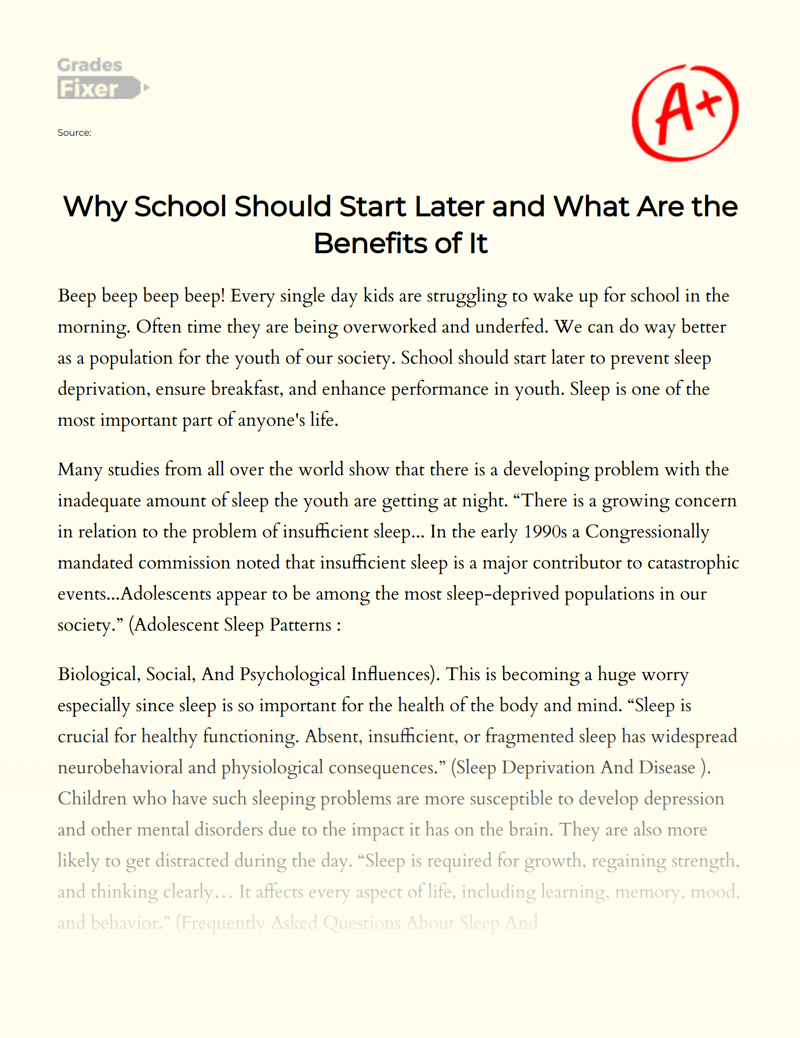
Still can’t find what you need?
Browse our vast selection of original essay samples, each expertly formatted and styled
Everyone has always hated getting up super early to go to school. As children get older they move to different schools, from elementary to middle to high school, and the start times get earlier. In elementary school it was never [...]
The issue of school start times has been a topic of debate for many years, with arguments on both sides of the issue. While some argue that starting school later would allow students to get more sleep and perform better [...]
Should school start times be later in the day or should they be earlier? If kids don't get enough sleep can it affect kids performance in school and sports? Not getting a enough sleep is common among students and is among many [...]
In a society where more is expected from teenage students and schoolwork is harder than that from generations before, it is necessary for the school day to start and end at later times. Early start times have created negative [...]
Question: Using Brian Holmes problem solving approach, identify an educational problem in your school or area and demonstrate how you can use the approach to investigate and attempt solutions to the problem. Education is a [...]
In a very broad sense, cheating involves betraying a partner’s expectations about the type of contact the cheater has with others. When a husband or wife, boyfriend or girlfriend, violates one’s expectations about what is [...]
Related Topics
By clicking “Send”, you agree to our Terms of service and Privacy statement . We will occasionally send you account related emails.
Where do you want us to send this sample?
By clicking “Continue”, you agree to our terms of service and privacy policy.
Be careful. This essay is not unique
This essay was donated by a student and is likely to have been used and submitted before
Download this Sample
Free samples may contain mistakes and not unique parts
Sorry, we could not paraphrase this essay. Our professional writers can rewrite it and get you a unique paper.
Please check your inbox.
We can write you a custom essay that will follow your exact instructions and meet the deadlines. Let's fix your grades together!
Get Your Personalized Essay in 3 Hours or Less!
We use cookies to personalyze your web-site experience. By continuing we’ll assume you board with our cookie policy .
- Instructions Followed To The Letter
- Deadlines Met At Every Stage
- Unique And Plagiarism Free
SAT Registration
Show colleges you're ready: register for the SAT from your College Board account.
Dates and Deadlines
FRI, JUN 14, 2024
June SAT Score Release
FRI, AUG 9, 2024
Registration Deadline for August SAT
TUE, AUG 13, 2024
Late Registration Deadline for August SAT
SAT, AUG 24, 2024
7:45 AM Local
August 24 SAT
Success Starts with the SAT
Find a Test Center
Test center search.
Search for places that offer the SAT. You'll choose a specific location when you register.
Test Center Closings
Get the latest information about test center closings.
SAT Dates and Deadlines
Use these dates to plan to take the SAT.
Fee Waivers
If you're eligible for a fee waiver, you can take the SAT for free and get other benefits.
SAT fee waivers are available to low-income 11th- and 12th-grade students in the U.S. or U.S. territories.
If you qualify, benefits include two free sat tests, unlimited score reports to send to colleges, and waived application fees at participating colleges..

For K–12 Educators
Accommodations.
Students who have a documented disability may be eligible for testing accommodations when they take the SAT.
SAT fee waivers are sent directly to schools and community-based organizations (CBOs).
School Code Search
Search for K–12 school codes, also known as College Entrance Examination Board (CEEB) codes. These codes identify your institution to College Board.

IMAGES
COMMENTS
7. Reduced Stress. The stress induced by early mornings and lack of sleep can significantly affect students' academic and social lives. By moving the start of the school day later, schools can alleviate a major source of daily stress, contributing to a healthier, more conducive learning environment.
Introduction. Benefits Of Starting School Later. An early school day affects the overall learning environment. When classes start later, attendance improves, and tardiness decreases. Sleep affects academic performance. Later school schedules lower the risk of health problems. Later school activities can lower the risk of vehicular accidents.
In conclusion, school start times actually decrease the kids performance in school or sports. The average school start time is 7:30am and the time we should go to school is 9:00 a.m or around them. The early start times can lower depression, drug use, performance, and fewer car crashes. "Once these school districts change, they don't want to ...
It has been noticed that older students and younger students, such as third graders and eleventh graders, sleep patterns are very different. In many places, it is the same way that middle schools and high school start earlier than elementary schools. So why should school start later? Argumentative essay will provide the answer.
Dan Kwartler. Teens don't get enough sleep, and it's not because of Snapchat, social lives or hormones -- it's because of public policy, says Wendy Troxel. Drawing from her experience as a sleep researcher, clinician and mother of a teenager, Troxel discusses how early school start times deprive adolescents of sleep during the time of their ...
Here are some of the benefits of later school start times: Better mental and physical health. Improved academic outcomes. Reduced risk of car accidents and injuries. Less tardiness. READ ...
Delaying start times. Though comprehensive national statistics on school start times are not available, it is common for American public high schools to begin their instructional day between 7-8 a.m. Research has shown that these early bell times are responsible for the discrepancy between how much sleep teens need and how much sleep they get ...
The Science of Sleep. In the U.S., the average start time for middle and high schools is a few minutes after 8 a.m. It hasn't always been this way, though. A century ago, most schools started around 9 a.m. Then in the 1970s, districts began shifting to earlier schedules for teens, with elementary age kids starting later.
One innovative study looks at U.S. Air Force Academy freshmen cadets who were randomly assigned to earlier or later start times (thanks to having a class in the first period or not) and shows that ...
The American Academy of Pediatrics says that middle and high schools shouldn't start before 8:30 a.m. That's because as people go through puberty, their internal clocks naturally shift. It becomes hard for them to nod off before 11:00 p.m. But teens still need an average of nine hours of sleep per night. So, when they have to get up before ...
Why Should School Start Later: Negative Effects of Early School Start Essay Everyone has always hated getting up super early to go to school. As children get older they move to different schools, from elementary to middle to high school, and the start times get earlier.
In conclusion, there are many advantages to having school start later. School starting later would give students more time to get adequate sleep, which helps with their mental and physical health. Furthermore, students would be more alert and have better focus during their classes, allowing them to absorb more information and make better grades.
Here are my top 10 reasons why school should start later. Helps students focus. Caters to their natural sleep timetable. Reduce the risk of car accidents. Reduces risky behavior. Improves information retention. Helps teens feel happier. Improves attendance. Reduces stress.
So a later school start time could help to solve this problem, by ensuring teenagers get their eight plus hours of sleep and react properly to their body's natural rhythms. The American Academy ...
About 90 percent of high schools and 80 percent of middle schools in the nation start before 8:30 a.m., the Centers for Disease Control and Prevention said in 2014. Students, read the entire ...
Sleep is vital to your well-being. Sleep is as important as what you put into your body. K-12 schools should start later in the morning in order for students to get the required amount of sleep to be able to focus and engage in school, have a better attitude, and have better physical and mental health. Students need plenty of sleep to be able ...
For middle school students, a start time between 8:30 and 9:00 AM resulted in a greater number of students getting sufficient sleep (defined as at least 9 hours). Of note is that only about a ...
83% of U.S. public high schools started before 8:30 a.m. in 2020. 44.2% of surveyed parents say they like school start times the way they are, with 34.8% wanting later starts and 21% seeking earlier ones. 69.2% of parents and guardians say their school-age children were getting sufficient sleep this past school year.
Forty-two percent of schools started earlier, including 10 percent—predominantly suburban schools—before 7:30 a.m. These start times are too early, according to the American Academy of Pediatrics (AAP). Middle and high schools should start at 8:30 a.m. or later to give students the opportunity to get the sleep they need.
Even with later start times, many of these parents will still have to drop their kids off at school before they go to work. These students won't be getting any more sleep, and the additional idle unsupervised time alone could put them in danger. Parents shouldn't have to choose between keeping their jobs and ensuring the safety of their ...
Getting up early ensures that students are ready for a bed at a decent time, avoiding some risky situations often associated with detrimental behavior. 10. Prompts a Healthy Lifestyle. Schools starting earlier not only helps students establish a morning routine, but it also benefits their lifestyle as whole.
9605. Most students if asked would tell you that they wish school started later. Many studies have shown that a later start time for school can be quite beneficial for the students. I believe that school should start later due to many reasons that I will address. For one, if school started later students would be able to get more sleep.
The following ideas work well for compare-contrast essays. ( Find 80+ compare-contrast essay topics for all ages here.) Public and private schools. Capitalism vs. communism. Monarchy or democracy. Dogs vs. cats as pets. WeAreTeachers. Paper books or e-books. Two political candidates in a current race.
Why Should School Start Later: Negative Effects of Early School Start Essay Everyone has always hated getting up super early to go to school. As children get older they move to different schools, from elementary to middle to high school, and the start times get earlier.
Fee Waivers. If you're eligible for a fee waiver, you can take the SAT for free and get other benefits. SAT fee waivers are available to low-income 11th- and 12th-grade students in the U.S. or U.S. territories. If you qualify, benefits include two free SAT tests, unlimited score reports to send to colleges, and waived application fees at ...
NIGER DELTA TODAY #adbn #adbntv